

Literary Criticism
- Introduction
- Literary Theories
- Steps to Literary Criticism
- Find Resources
- Cite Sources
- thesis examples
SAMPLE THESIS STATEMENTS
These sample thesis statements are provided as guides, not as required forms or prescriptions.
______________________________________________________________________________________________________________
The thesis may focus on an analysis of one of the elements of fiction, drama, poetry or nonfiction as expressed in the work: character, plot, structure, idea, theme, symbol, style, imagery, tone, etc.
In “A Worn Path,” Eudora Welty creates a fictional character in Phoenix Jackson whose determination, faith, and cunning illustrate the indomitable human spirit.
Note that the work, author, and character to be analyzed are identified in this thesis statement. The thesis relies on a strong verb (creates). It also identifies the element of fiction that the writer will explore (character) and the characteristics the writer will analyze and discuss (determination, faith, cunning).
Further Examples:
The character of the Nurse in Romeo and Juliet serves as a foil to young Juliet, delights us with her warmth and earthy wit, and helps realize the tragic catastrophe.
The works of ecstatic love poets Rumi, Hafiz, and Kabir use symbols such as a lover’s longing and the Tavern of Ruin to illustrate the human soul’s desire to connect with God.
The thesis may focus on illustrating how a work reflects the particular genre’s forms, the characteristics of a philosophy of literature, or the ideas of a particular school of thought.
“The Third and Final Continent” exhibits characteristics recurrent in writings by immigrants: tradition, adaptation, and identity.
Note how the thesis statement classifies the form of the work (writings by immigrants) and identifies the characteristics of that form of writing (tradition, adaptation, and identity) that the essay will discuss.
Further examples:
Samuel Beckett’s Endgame reflects characteristics of Theatre of the Absurd in its minimalist stage setting, its seemingly meaningless dialogue, and its apocalyptic or nihilist vision.
A close look at many details in “The Story of an Hour” reveals how language, institutions, and expected demeanor suppress the natural desires and aspirations of women.
The thesis may draw parallels between some element in the work and real-life situations or subject matter: historical events, the author’s life, medical diagnoses, etc.
In Willa Cather’s short story, “Paul’s Case,” Paul exhibits suicidal behavior that a caring adult might have recognized and remedied had that adult had the scientific knowledge we have today.
This thesis suggests that the essay will identify characteristics of suicide that Paul exhibits in the story. The writer will have to research medical and psychology texts to determine the typical characteristics of suicidal behavior and to illustrate how Paul’s behavior mirrors those characteristics.
Through the experience of one man, the Narrative of the Life of Frederick Douglass, An American Slave, accurately depicts the historical record of slave life in its descriptions of the often brutal and quixotic relationship between master and slave and of the fragmentation of slave families.
In “I Stand Here Ironing,” one can draw parallels between the narrator’s situation and the author’s life experiences as a mother, writer, and feminist.
SAMPLE PATTERNS FOR THESES ON LITERARY WORKS
1. In (title of work), (author) (illustrates, shows) (aspect) (adjective).
Example: In “Barn Burning,” William Faulkner shows the characters Sardie and Abner Snopes struggling for their identity.
2. In (title of work), (author) uses (one aspect) to (define, strengthen, illustrate) the (element of work).
Example: In “Youth,” Joseph Conrad uses foreshadowing to strengthen the plot.
3. In (title of work), (author) uses (an important part of work) as a unifying device for (one element), (another element), and (another element). The number of elements can vary from one to four.
Example: In “Youth,” Joseph Conrad uses the sea as a unifying device for setting, structure and theme.
4. (Author) develops the character of (character’s name) in (literary work) through what he/she does, what he/she says, what other people say to or about him/her.
Example: Langston Hughes develops the character of Semple in “Ways and Means”…
5. In (title of work), (author) uses (literary device) to (accomplish, develop, illustrate, strengthen) (element of work).
Example: In “The Masque of the Red Death,” Poe uses the symbolism of the stranger, the clock, and the seventh room to develop the theme of death.
6. (Author) (shows, develops, illustrates) the theme of __________ in the (play, poem, story).
Example: Flannery O’Connor illustrates the theme of the effect of the selfishness of the grandmother upon the family in “A Good Man is Hard to Find.”
7. (Author) develops his character(s) in (title of work) through his/her use of language.
Example: John Updike develops his characters in “A & P” through his use of figurative language.
Perimeter College, Georgia State University, http://depts.gpc.edu/~gpcltc/handouts/communications/literarythesis.pdf
- << Previous: Cite Sources
- Next: Get Help >>
- Last Updated: Jun 12, 2024 8:56 AM
- URL: https://libguides.uta.edu/literarycriticism
University of Texas Arlington Libraries 702 Planetarium Place · Arlington, TX 76019 · 817-272-3000
- Internet Privacy
- Accessibility
- Problems with a guide? Contact Us.

- school Campus Bookshelves
- menu_book Bookshelves
- perm_media Learning Objects
- login Login
- how_to_reg Request Instructor Account
- hub Instructor Commons
Margin Size
- Download Page (PDF)
- Download Full Book (PDF)
- Periodic Table
- Physics Constants
- Scientific Calculator
- Reference & Cite
- Tools expand_more
- Readability
selected template will load here
This action is not available.

12.6: Literary Thesis Statements
- Last updated
- Save as PDF
- Page ID 43636

- Heather Ringo & Athena Kashyap
- City College of San Francisco via ASCCC Open Educational Resources Initiative
\( \newcommand{\vecs}[1]{\overset { \scriptstyle \rightharpoonup} {\mathbf{#1}} } \)
\( \newcommand{\vecd}[1]{\overset{-\!-\!\rightharpoonup}{\vphantom{a}\smash {#1}}} \)
\( \newcommand{\id}{\mathrm{id}}\) \( \newcommand{\Span}{\mathrm{span}}\)
( \newcommand{\kernel}{\mathrm{null}\,}\) \( \newcommand{\range}{\mathrm{range}\,}\)
\( \newcommand{\RealPart}{\mathrm{Re}}\) \( \newcommand{\ImaginaryPart}{\mathrm{Im}}\)
\( \newcommand{\Argument}{\mathrm{Arg}}\) \( \newcommand{\norm}[1]{\| #1 \|}\)
\( \newcommand{\inner}[2]{\langle #1, #2 \rangle}\)
\( \newcommand{\Span}{\mathrm{span}}\)
\( \newcommand{\id}{\mathrm{id}}\)
\( \newcommand{\kernel}{\mathrm{null}\,}\)
\( \newcommand{\range}{\mathrm{range}\,}\)
\( \newcommand{\RealPart}{\mathrm{Re}}\)
\( \newcommand{\ImaginaryPart}{\mathrm{Im}}\)
\( \newcommand{\Argument}{\mathrm{Arg}}\)
\( \newcommand{\norm}[1]{\| #1 \|}\)
\( \newcommand{\Span}{\mathrm{span}}\) \( \newcommand{\AA}{\unicode[.8,0]{x212B}}\)
\( \newcommand{\vectorA}[1]{\vec{#1}} % arrow\)
\( \newcommand{\vectorAt}[1]{\vec{\text{#1}}} % arrow\)
\( \newcommand{\vectorB}[1]{\overset { \scriptstyle \rightharpoonup} {\mathbf{#1}} } \)
\( \newcommand{\vectorC}[1]{\textbf{#1}} \)
\( \newcommand{\vectorD}[1]{\overrightarrow{#1}} \)
\( \newcommand{\vectorDt}[1]{\overrightarrow{\text{#1}}} \)
\( \newcommand{\vectE}[1]{\overset{-\!-\!\rightharpoonup}{\vphantom{a}\smash{\mathbf {#1}}}} \)
The Literary Thesis Statement
Literary essays are argumentative or persuasive essays. Their purpose is primarily analysis, but analysis for the purposes of showing readers your interpretation of a literary text. So the thesis statement is a one to two sentence summary of your essay's main argument, or interpretation.
Just like in other argumentative essays, the thesis statement should be a kind of opinion based on observable fact about the literary work.
Thesis Statements Should Be
- This thesis takes a position. There are clearly those who could argue against this idea.
- Look at the text in bold. See the strong emphasis on how form (literary devices like symbolism and character) acts as a foundation for the interpretation (perceived danger of female sexuality).
- Through this specific yet concise sentence, readers can anticipate the text to be examined ( Huckleberry Finn) , the author (Mark Twain), the literary device that will be focused upon (river and shore scenes) and what these scenes will show (true expression of American ideals can be found in nature).
Thesis Statements Should NOT Be
- While we know what text and author will be the focus of the essay, we know nothing about what aspect of the essay the author will be focusing upon, nor is there an argument here.
- This may be well and true, but this thesis does not appear to be about a work of literature. This could be turned into a thesis statement if the writer is able to show how this is the theme of a literary work (like "Girl" by Jamaica Kincaid) and root that interpretation in observable data from the story in the form of literary devices.
- Yes, this is true. But it is not debatable. You would be hard-pressed to find someone who could argue with this statement. Yawn, boring.
- This may very well be true. But the purpose of a literary critic is not to judge the quality of a literary work, but to make analyses and interpretations of the work based on observable structural aspects of that work.
- Again, this might be true, and might make an interesting essay topic, but unless it is rooted in textual analysis, it is not within the scope of a literary analysis essay. Be careful not to conflate author and speaker! Author, speaker, and narrator are all different entities! See: intentional fallacy.
Thesis Statement Formula
One way I find helpful to explain literary thesis statements is through a "formula":
Thesis statement = Observation + Analysis + Significance
- Observation: usually regarding the form or structure of the literature. This can be a pattern, like recurring literary devices. For example, "I noticed the poems of Rumi, Hafiz, and Kabir all use symbols such as the lover's longing and Tavern of Ruin "
- Analysis: You could also call this an opinion. This explains what you think your observations show or mean. "I think these recurring symbols all represent the human soul's desire." This is where your debatable argument appears.
- Significance: this explains what the significance or relevance of the interpretation might be. Human soul's desire to do what? Why should readers care that they represent the human soul's desire? "I think these recurring symbols all show the human soul's desire to connect with God. " This is where your argument gets more specific.
Thesis statement: The works of ecstatic love poets Rumi, Hafiz, and Kabir use symbols such as a lover’s longing and the Tavern of Ruin to illustrate the human soul’s desire to connect with God .
Thesis Examples
SAMPLE THESIS STATEMENTS
These sample thesis statements are provided as guides, not as required forms or prescriptions.
______________________________________________________________________________________________________________
The Literary Device Thesis Statement
The thesis may focus on an analysis of one of the elements of fiction, drama, poetry or nonfiction as expressed in the work: character, plot, structure, idea, theme, symbol, style, imagery, tone, etc.
In “A Worn Path,” Eudora Welty creates a fictional character in Phoenix Jackson whose determination, faith, and cunning illustrate the indomitable human spirit.
Note that the work, author, and character to be analyzed are identified in this thesis statement. The thesis relies on a strong verb (creates). It also identifies the element of fiction that the writer will explore (character) and the characteristics the writer will analyze and discuss (determination, faith, cunning).
The character of the Nurse in Romeo and Juliet serves as a foil to young Juliet, delights us with her warmth and earthy wit, and helps realize the tragic catastrophe.
The Genre / Theory Thesis Statement
The thesis may focus on illustrating how a work reflects the particular genre’s forms, the characteristics of a philosophy of literature, or the ideas of a particular school of thought.
“The Third and Final Continent” exhibits characteristics recurrent in writings by immigrants: tradition, adaptation, and identity.
Note how the thesis statement classifies the form of the work (writings by immigrants) and identifies the characteristics of that form of writing (tradition, adaptation, and identity) that the essay will discuss.
Samuel Beckett’s Endgame reflects characteristics of Theatre of the Absurd in its minimalist stage setting, its seemingly meaningless dialogue, and its apocalyptic or nihilist vision.
A close look at many details in “The Story of an Hour” reveals how language, institutions, and expected demeanor suppress the natural desires and aspirations of women.
Generative Questions
One way to come up with a riveting thesis statement is to start with a generative question. The question should be open-ended and, hopefully, prompt some kind of debate.
- What is the effect of [choose a literary device that features prominently in the chosen text] in this work of literature?
- How does this work of literature conform or resist its genre, and to what effect?
- How does this work of literature portray the environment, and to what effect?
- How does this work of literature portray race, and to what effect?
- How does this work of literature portray gender, and to what effect?
- What historical context is this work of literature engaging with, and how might it function as a commentary on this context?
These are just a few common of the common kinds of questions literary scholars engage with. As you write, you will want to refine your question to be even more specific. Eventually, you can turn your generative question into a statement. This then becomes your thesis statement. For example,
- How do environment and race intersect in the character of Frankenstein's monster, and what can we deduce from this intersection?
Expert Examples
While nobody expects you to write professional-quality thesis statements in an undergraduate literature class, it can be helpful to examine some examples. As you view these examples, consider the structure of the thesis statement. You might also think about what questions the scholar wondered that led to this statement!
- "Heart of Darkness projects the image of Africa as 'the other world,' the antithesis of Europe and therefore civilization, a place where man's vaunted intelligence and refinement are finally mocked by triumphant bestiality" (Achebe 3).
- "...I argue that the approach to time and causality in Boethius' sixth-century Consolation of Philosophy can support abolitionist objectives to dismantle modern American policing and carceral systems" (Chaganti 144).
- "I seek to expand our sense of the musico-poetic compositional practices available to Shakespeare and his contemporaries, focusing on the metapoetric dimensions of Much Ado About Nothing. In so doing, I work against the tendency to isolate writing as an independent or autonomous feature the work of early modern poets and dramatists who integrated bibliographic texts with other, complementary media" (Trudell 371).
Works Cited
Achebe, Chinua. "An Image of Africa" Research in African Literatures 9.1 , Indiana UP, 1978. 1-15.
Chaganti, Seeta. "Boethian Abolition" PMLA 137.1 Modern Language Association, January 2022. 144-154.
"Thesis Statements in Literary Analysis Papers" Author unknown. https://resources.finalsite.net/imag...handout__1.pdf
Trudell, Scott A. "Shakespeare's Notation: Writing Sound in Much Ado about Nothing " PMLA 135.2, Modern Language Association, March 2020. 370-377.
Contributors and Attributions
Thesis Examples. Authored by: University of Arlington Texas. License: CC BY-NC
Thesis Statements for a Literature Assignment
A thesis prepares the reader for what you are about to say. As such, your paper needs to be interesting in order for your thesis to be interesting. Your thesis needs to be interesting because it needs to capture a reader's attention. If a reader looks at your thesis and says "so what?", your thesis has failed to do its job, and chances are your paper has as well. Thus, make your thesis provocative and open to reasonable disagreement, but then write persuasively enough to sway those who might be disagree.
Keep in mind the following when formulating a thesis:
- A Thesis Should Not State the Obvious
- Use Literary Terms in Thesis With Care
- A Thesis Should be Balanced
- A Thesis Can be a Blueprint
Avoid the Obvious
Bland: Dorothy Parker's "Résumé" uses images of suicide to make her point about living.
This is bland because it's obvious and incontestable. A reader looks at it and says, "so what?"
However, consider this alternative:
Dorothy Parker's "Résumé" doesn't celebrate life, but rather scorns those who would fake or attempt suicide just to get attention.
The first thesis merely describes something about the poem; the second tells the reader what the writer thinks the poem is about--it offers a reading or interpretation. The paper would need to support that reading and would very likely examine the way Parker uses images of suicide to make the point the writer claims.
Use Literary Terms in Thesis Only to Make Larger Points
Poems and novels generally use rhyme, meter, imagery, simile, metaphor, stanzas, characters, themes, settings and so on. While these terms are important for you to use in your analysis and your arguments, that they exist in the work you are writing about should not be the main point of your thesis. Unless the poet or novelist uses these elements in some unexpected way to shape the work's meaning, it's generally a good idea not to draw attention to the use of literary devices in thesis statements because an intelligent reader expects a poem or novel to use literary of these elements. Therefore, a thesis that only says a work uses literary devices isn't a good thesis because all it is doing is stating the obvious, leading the reader to say, "so what?"
However, you can use literary terms in a thesis if the purpose is to explain how the terms contribute to the work's meaning or understanding. Here's an example of thesis statement that does call attention to literary devices because they are central to the paper's argument. Literary terms are placed in italics.
Don Marquis introduced Archy and Mehitabel in his Sun Dial column by combining the conventions of free verse poetry with newspaper prose so intimately that in "the coming of Archy," the entire column represents a complete poem and not a free verse poem preceded by a prose introduction .
Note the difference between this thesis and the first bland thesis on the Parker poem. This thesis does more than say certain literary devices exist in the poem; it argues that they exist in a specific relationship to one another and makes a fairly startling claim, one that many would disagree with and one that the writer will need to persuade her readers on.
Keep Your Thesis Balanced
Keep the thesis balanced. If it's too general, it becomes vague; if it's too specific, it cannot be developed. If it's merely descriptive (like the bland example above), it gives the reader no compelling reason to go on. The thesis should be dramatic, have some tension in it, and should need to be proved (another reason for avoiding the obvious).
Too general: Edna St. Vincent Millay wrote many poems with love as the theme. Too specific: Edna St. Vincent Millay wrote "Love is not all: it is not meat nor drink" in <insert date> after <insert event from her life>. Too descriptive: Edna St. Vincent Millay's "Love is not all: it is not meat nor drink" is a sonnet with two parts; the first six lines propose a view of love and the next eight complicate that view. With tension and which will need proving: Despite her avowal on the importance of love, and despite her belief that she would not sell her love, the speaker in Edna St. Vincent Millay's "Love is not all: it is not meat nor drink" remains unconvinced and bitter, as if she is trying to trick herself into believing that love really does matter for more than the one night she is in some lover's arms.
Your Thesis Can Be A Blueprint
A thesis can be used as roadmap or blueprint for your paper:
In "Résumé," Dorothy Parker subverts the idea of what a résumé is--accomplishments and experiences--with an ironic tone, silly images of suicide, and witty rhymes to point out the banality of life for those who remain too disengaged from it.
Note that while this thesis refers to particular poetic devices, it does so in a way that gets beyond merely saying there are poetic devices in the poem and then merely describing them. It makes a claim as to how and why the poet uses tone, imagery and rhyme.
Readers would expect you to argue that Parker subverts the idea of the résumé to critique bored (and boring) people; they would expect your argument to do so by analyzing her use of tone, imagery and rhyme in that order.
Citation Information
Nick Carbone. (1994-2024). Thesis Statements for a Literature Assignment. The WAC Clearinghouse. Colorado State University. Available at https://wac.colostate.edu/repository/writing/guides/.
Copyright Information
Copyright © 1994-2024 Colorado State University and/or this site's authors, developers, and contributors . Some material displayed on this site is used with permission.

Thesis Statements for a Literature Assignment
A thesis prepares the reader for what you are about to say. As such, your paper needs to be interesting in order for your thesis to be interesting. Your thesis needs to be interesting because it needs to capture a reader's attention. If a reader looks at your thesis and says "so what?", your thesis has failed to do its job, and chances are your paper has as well. Thus, make your thesis provocative and open to reasonable disagreement, but then write persuasively enough to sway those who might be disagree.
Keep in mind the following when formulating a thesis:
- A Thesis Should Not State the Obvious
- Use Literary Terms in Thesis With Care
- A Thesis Should be Balanced
- A Thesis Can be a Blueprint
Avoid the Obvious
Bland: Dorothy Parker's "Résumé" uses images of suicide to make her point about living.
This is bland because it's obvious and incontestable. A reader looks at it and says, "so what?"
However, consider this alternative:
Dorothy Parker's "Résumé" doesn't celebrate life, but rather scorns those who would fake or attempt suicide just to get attention.
The first thesis merely describes something about the poem; the second tells the reader what the writer thinks the poem is about--it offers a reading or interpretation. The paper would need to support that reading and would very likely examine the way Parker uses images of suicide to make the point the writer claims.
Use Literary Terms in Thesis Only to Make Larger Points
Poems and novels generally use rhyme, meter, imagery, simile, metaphor, stanzas, characters, themes, settings and so on. While these terms are important for you to use in your analysis and your arguments, that they exist in the work you are writing about should not be the main point of your thesis. Unless the poet or novelist uses these elements in some unexpected way to shape the work's meaning, it's generally a good idea not to draw attention to the use of literary devices in thesis statements because an intelligent reader expects a poem or novel to use literary of these elements. Therefore, a thesis that only says a work uses literary devices isn't a good thesis because all it is doing is stating the obvious, leading the reader to say, "so what?"
However, you can use literary terms in a thesis if the purpose is to explain how the terms contribute to the work's meaning or understanding. Here's an example of thesis statement that does call attention to literary devices because they are central to the paper's argument. Literary terms are placed in italics.
Don Marquis introduced Archy and Mehitabel in his Sun Dial column by combining the conventions of free verse poetry with newspaper prose so intimately that in "the coming of Archy," the entire column represents a complete poem and not a free verse poem preceded by a prose introduction .
Note the difference between this thesis and the first bland thesis on the Parker poem. This thesis does more than say certain literary devices exist in the poem; it argues that they exist in a specific relationship to one another and makes a fairly startling claim, one that many would disagree with and one that the writer will need to persuade her readers on.
Keep Your Thesis Balanced
Keep the thesis balanced. If it's too general, it becomes vague; if it's too specific, it cannot be developed. If it's merely descriptive (like the bland example above), it gives the reader no compelling reason to go on. The thesis should be dramatic, have some tension in it, and should need to be proved (another reason for avoiding the obvious).
Too general: Edna St. Vincent Millay wrote many poems with love as the theme. Too specific: Edna St. Vincent Millay wrote "Love is not all: it is not meat nor drink" in <insert date> after <insert event from her life>. Too descriptive: Edna St. Vincent Millay's "Love is not all: it is not meat nor drink" is a sonnet with two parts; the first six lines propose a view of love and the next eight complicate that view. With tension and which will need proving: Despite her avowal on the importance of love, and despite her belief that she would not sell her love, the speaker in Edna St. Vincent Millay's "Love is not all: it is not meat nor drink" remains unconvinced and bitter, as if she is trying to trick herself into believing that love really does matter for more than the one night she is in some lover's arms.
Your Thesis Can Be A Blueprint
A thesis can be used as roadmap or blueprint for your paper:
In "Résumé," Dorothy Parker subverts the idea of what a résumé is--accomplishments and experiences--with an ironic tone, silly images of suicide, and witty rhymes to point out the banality of life for those who remain too disengaged from it.
Note that while this thesis refers to particular poetic devices, it does so in a way that gets beyond merely saying there are poetic devices in the poem and then merely describing them. It makes a claim as to how and why the poet uses tone, imagery and rhyme.
Readers would expect you to argue that Parker subverts the idea of the résumé to critique bored (and boring) people; they would expect your argument to do so by analyzing her use of tone, imagery and rhyme in that order.
Carbone, Nick. (1997). Thesis Statements for a Literature Assignment. Writing@CSU . Colorado State University. https://writing.colostate.edu/guides/guide.cfm?guideid=51

Writing a Thesis
Writing thesis in literature.

“God Speed” by Edmund Leighton, 1900
Sample Titles of Recent Theses in Literature

“Bilbo comes to the Huts of the Raft-elves” by J.R.R. Tolkien, 1973
What does a thesis do for me?
Thesis writers can be assured that they have been well prepared for graduate study, and can attest to that fact in their applications and interviews. They have also gained skills that will help them in any workplace. The intensive, self-motivated focus on one topic can be (at times) frustrating, overwhelming, and deeply gratifying: the rewards are many, and most students find their love of literature strengthened through their own efforts and dedication, as well as through the opportunity to work one-on-one with faculty scholars. The time and commitment involved in the process of writing a thesis may or may not exceed the credit hours officially accorded, but the rewards are great. This is a serious undertaking and assumes that the thesis candidate is a responsible adult, able to make deadlines and keep to them without external prodding, and ready to become a literary scholar with a mind of her own.
What do I do for my thesis?

“Donna con tavolette cerate e stilo (cosiddetta “Saffo”)/Woman with wax tablets and stylus (so-called “Sappho”)” fresco ca. 50 CE
Fall Semester: Preparatory Work
If they have not done so in the the Spring of the junior year, thesis candidates should consult with faculty prior to Registration Day to determine who would be an appropriate advisor. The thesis will eventually be read and evaluated by three faculty members: the advisor my suggest second and third readers, or may leave the decision to the student. Developing an argument takes time, but candidates should begin with a clear set of interests in mind, and ideally with background reading underway. Students may choose to focus on a particular author or literary text, or to connect several authors and texts through attention to a shared thematic or formal pattern.
Regular Supervision and Deadlines

“Beloved” by Joe Morse, 2015
Spring Semester: 12-Unit Thesis
During the spring semester, the thesis candidate signs up for the 12-unit Thesis and devotes substantial energy to expanding, completing, and revising the work. The student should continue to meet on a regular basis with the advisor, and should also be sharing draft chapters with the second and third readers as soon as possible. The thesis process involves extensive revision as well as writing, and students need to anticipate that as the semester proceeds their readers will have an increasing number of competing demands on their time from other classes: chapters may not be returned with comments and recommendations for revision until some time after being submitted, and thesis writers need to plan accordingly. A complete first draft should be submitted by the end of spring break or the beginning of April, depending on the academic calendar and the advisor’s schedule. This ensures adequate time for commentary and extensive final revision before the official Institute deadline for undergraduate theses (usually at the end of the penultimate week of classes, and listed on the official Academic Calendar).
After Completion

“Alice’s Adventures in Wonderland, The Mad Tea Party” by Sir John Tenniel, 1865

Writing a Literary Analysis Thesis Statement: A Step-by-Step Guide
Published : January 22, 2024
By | MyPremiumEssay 10 mins read
The thesis statement in an essay serves as the guiding principle, encapsulating the central message or argument of your work. In the context of a literary analysis essay, this statement should directly respond to the prompt or question presented. If the essay is centered around a specific query, the thesis statement should effectively provide a response to that inquiry. Similarly, if the essay requires commentary on a particular aspect of the text, the thesis should clearly indicate the direction and focus of these comments. Essentially, the thesis statement should align seamlessly with the objectives of the essay, setting the stage for your analysis and insights. Here remember that services offering the option to buy essays online can be a useful tool for understanding different perspectives and approaches.
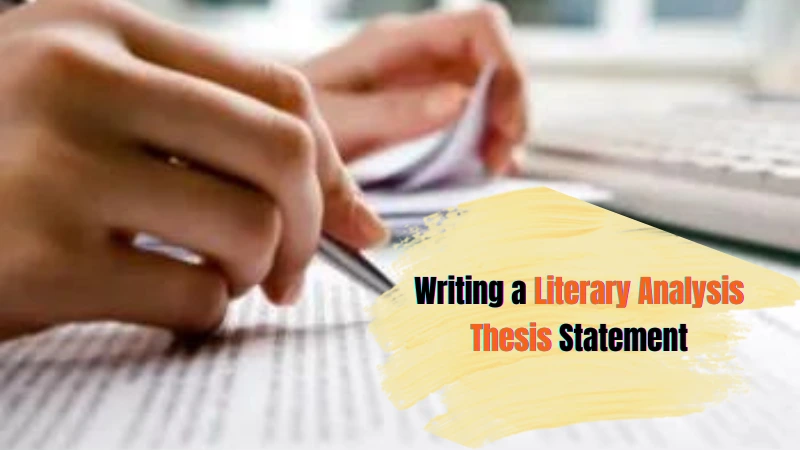
Your thesis is your spotlight, highlighting unseen angles in well-trodden stories. Ready to craft a statement that surprises and engages? Let's dive in.
What is a Literary Analysis?
Writing a thesis statement for a literary analysis, sample thesis statements, tips for refining your thesis, final thoughts.
Literary analysis is the practice of examining and interpreting the deeper meanings and structures of literature. It involves analyzing elements like characters, themes, symbols, and writing style.
A literary analysis also involves questioning and challenging the text. Why does the author choose certain words? What is the effect of a particular narrative perspective? How do themes reflect the time in which the work was written, and how do they resonate today?
It's a journey that is subjective and personal yet grounded in scholarly methods and evidence.
Writing a thesis statement for a literary analysis essay requires a blend of creativity and precision. Your goal is to present an insightful interpretation that offers a fresh perspective on the text. Here's a more nuanced approach:
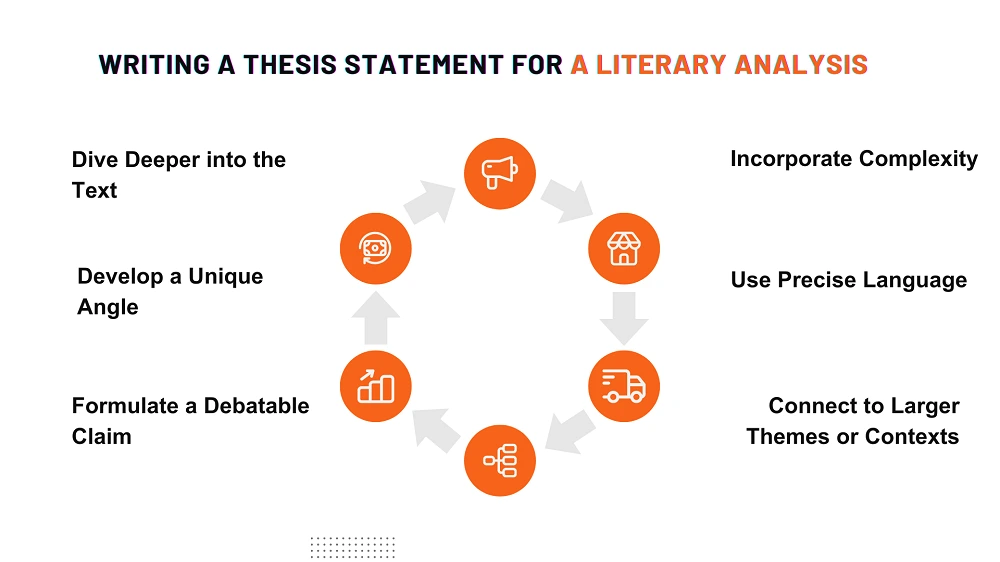
Dive Deeper into the Text
Go beyond the obvious themes and characters. Consider subtleties, contradictions, and complexities in the text. This could involve examining lesser-discussed characters, overlooked themes, or unique narrative techniques.
Develop a Unique Angle
Find an aspect of the literary work that sparks your interest or seems underexplored. This could be a minor character’s role in advancing the plot, the significance of a recurring motif, or the impact of the narrative structure on the story’s meaning.
Formulate a Debatable Claim
Your thesis should not only state an observation but also invite discussion. It should be something that isn't immediately obvious to every reader and could be open to interpretation.
Incorporate Complexity
Acknowledge the complexities or ambiguities of the text in your thesis. A strong thesis often includes a concession or a counterargument, indicating an awareness of alternative interpretations.
Use Precise Language
Be specific in your wording. Vague terms like “interesting” or “important” don’t offer much insight. Choose language that vividly conveys your analytical stance.
Connect to Larger Themes or Contexts
If applicable, link your argument to broader themes or societal issues. How does your interpretation of the text relate to larger human experiences or historical contexts?
Read More: How to Write a Thesis Statement?
These thesis statement examples serve as guides for analyzing literature. They show how to focus on different elements like character, plot, or theme, and how to draw parallels with real-life situations or historical events.
1 Analysis of Literary Elements
Example: In Eudora Welty's "A Worn Path," the character Phoenix Jackson is created with traits like determination and faith, showcasing the resilient human spirit. This statement focuses on character analysis and discusses specific attributes.
Example: The Nurse in "Romeo and Juliet" contrasts with Juliet, providing warmth and humor, and playing a key role in the play's tragic end.

Looking for expert support with your essay?
Trust us to refine your ideas and deliver eloquent responses that will impress your readers.
2 Reflecting Genre Characteristics
Example: "The Third and Final Continent" reflects common themes in immigrant literature, such as tradition and identity adaptation.
Example: Samuel Beckett's "Endgame" epitomizes Theatre of the Absurd with its minimalist setting and seemingly pointless dialogue, reflecting a nihilistic worldview.
3 Drawing Parallels with Real-life or Historical Events
Example: In Willa Cather's "Paul's Case," Paul's suicidal tendencies, which might have been recognized and treated today, are explored.
Example: "The Narrative of the Life of Frederick Douglass" authentically represents slave life, mirroring the complex master-slave dynamics and the fragmentation of slave families.
These examples illustrate how to craft a thesis statement that not only identifies the literary work and author but also clearly states the aspect of the work being analyzed or the real-life parallel being drawn. They highlight the importance of specific, focused analysis in literary studies.
Refining your thesis statement is a crucial step in writing a compelling literary analysis. Here are some tips to help you enhance and perfect your thesis:
1 Seek Feedback
Discuss your thesis with peers or instructors to get different perspectives. Feedback can help refine your argument.
2 Revise for Clarity and Strength
A good thesis evolves. Don’t hesitate to revise your statement for clarity, strength, and precision.
3 Align with Your Analysis
Ensure that your thesis statement aligns with the body of your essay. Each paragraph should support and build on your thesis.
Stay Curious: Keep exploring different facets of the text. Your thesis can evolve as you find new insights.
Be Bold: Don't shy away from controversial or unconventional interpretations, as long as they are well-supported.
Enjoy the Process: Literary analysis is an opportunity to engage deeply with a text and express your thoughts. Enjoy the intellectual challenge!
By following these guidelines and tips, you can write a thesis statement for your literary analysis that is not only insightful and thought-provoking but also less predictable and more engaging. Happy writing!
A well-formulated thesis not only adds depth to your analysis but also engages your readers, inviting them to explore the text through your unique lens. Remember, a great thesis statement not only demonstrates your understanding of the literature but also showcases your analytical skills. At My Premium Essay Our Experienced Essay Writers focus on helping you develop a thesis that is not only reflective and insightful but also illuminative, ensuring that your analysis delves deep into the literature.
Don't Forget to Share:
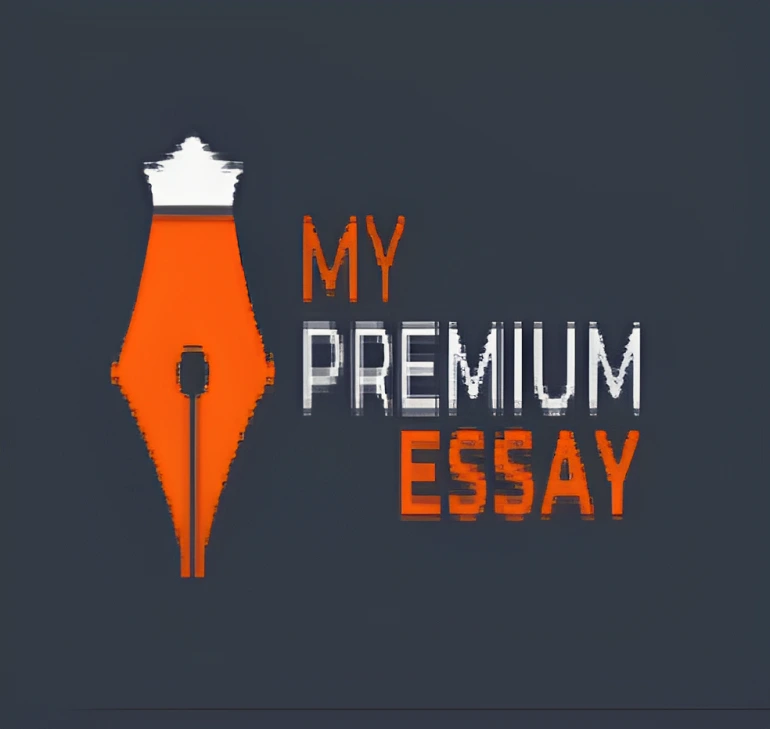
MyPremiumEssay
MyPremiumEssay is a comprehensive platform designed to assist students in their academic journey. Additionally, it features a collection of informative blogs, providing tips and advice on academic writing and research, all penned by highly qualified and experienced writers, serving as a helpful guide to enhancing students' skills and knowledge.
Social Media:
Related Blogs

- September 23, 2023
How To Write A Thesis Statement

- November 06, 2023
How to Conclude College Essay

- November 07, 2023
How To Write A Convincing Speech
Subscribe To Our NewsLetter
How to Write a Thesis Statement for a Literary Analysis Essay
Erica sweeney.

A literary analysis essay discusses a particular aspect of a work of literature. It essentially presents an argument or an interpretation about that work. Developing a clear, concise thesis for a literary analysis essay is highly important in guiding the reader through the essay and expressing your interpretation of the work. There is much preliminary work to do before actually writing the thesis.
Explore this article
- Gather Ideas and Information
- Read the work
- Develop a topic for the essay
- Make that the topic
- Write the Thesis
- Write one sentence
- Express a sort
- Do not simply state a fact
- Do not announce the thesis
1 Gather Ideas and Information
2 read the work.
Read the work of literature that you plan to write about. Read it more than once and read it carefully. Make sure that you understand the plot, who the characters are and what makes the work of literature special.
3 Brainstorm
Brainstorm about the important elements in the work. Do any symbols or themes stand out? How important is the setting? Critical thinking about the work at this stage will help you choose a topic and form an interpretation.
4 Develop a topic for the essay
Develop a topic for the essay. Use guidelines that your instructor has given you to do this. A topic for a literary analysis should focus on an important aspect of the work. It should advance knowledge in some way and not simply express a summary of the work.
5 Make that the topic
Make sure that the topic expresses an interpretation about the work. In developing a topic, answer this question to help you decide if your topic is acceptable: What can you tell people about the work that they can’t get from simply reading it?
6 Write the Thesis
7 write one sentence.
Write one sentence that expresses the aspect of the literary analysis that you are discussing and your interpretation of it. Both of these items must be clear in the thesis. The reader should read this one statement and know exactly what the essay will discuss.
8 Express a sort
Clearly express a sort of hypothesis that you will explain in the essay. This is an example of a good, argumentative thesis: "The narrator’s description of the family’s old house, their dream house and the house on Mango Street conveys the family’s struggle with expectations and reality."
9 Do not simply state a fact
Do not simply state a fact about the story. The following thesis is not a good one because it does not attempt to advance knowledge and it simply states a fact: "Emily killed Homer and kept his body for years. From reading William Faulkner’s “A Rose for Emily,” we know that this is a summation of the story’s ending."
10 Use clear
Use clear, concise and specific language. Don’t be too broad. If you want to write about symbolism in a work, you can’t possibly write about all of the symbols. To make the thesis more concise, pick just a few. Be very specific by listing the symbols you will discuss.
11 Do not announce the thesis
Do not announce the thesis in a literary analysis. For example, do not write: "This essay will discuss symbolism in 'A Rose for Emily.' "
About the Author
Erica Sweeney is a freelance writer and editor based in Little Rock, Ark. She has a master's in journalism from the University of Arkansas at Little Rock. Her work has been published at SaidIt.org, Arkansas Times, Aging Arkansas and Arkansas Business.
Related Articles

How to Write a Literary Analysis Paper

How to Write an Essay About a Piece of Literature

How to Write a Reflection Essay

How to Write an Insight Paper

How to Write an Informative Summary

What Are the Writing Elements for a Personal Narrative?

How to Write a Conclusion for a Literary Criticism

How to Write an Essay Synopsis

How to Write a Book Summary for 5th Graders

How to Write a Non-Fiction Book Summary

How to Write an Introduction for a Literary Analysis...

How to Critique a Dissertation

Higher Order Thinking Skills for Reading

How to Write a Five-Paragraph Essay About a Story

Creative Writing Topics for Second Grade on the Chinese...

How to Make Assertions in Literature

How to Write an Argumentative Essay on Poetry

Guidelines for Students to Write a Memoir

How to Write a Conclusion for a Compare & Contrast...

How to Write a College Book Analysis
Regardless of how old we are, we never stop learning. Classroom is the educational resource for people of all ages. Whether you’re studying times tables or applying to college, Classroom has the answers.
- Accessibility
- Terms of Use
- Privacy Policy
- Copyright Policy
- Manage Preferences
© 2020 Leaf Group Ltd. / Leaf Group Media, All Rights Reserved. Based on the Word Net lexical database for the English Language. See disclaimer .
- How to Cite
- Language & Lit
- Rhyme & Rhythm
- The Rewrite
- Search Glass
How to Write a Thesis for a Poetry Analysis Paper
The thesis statement can be the most difficult part of a poetry analysis to write, but this important component can help you create a powerful and provocative exploration of a poem. The trick is to first decide what you want to write about, followed by making one compelling argument about that subject.
Deciding What to Write About
After selecting or being assigned a poem, read and reread it to see what elements about it jump out at you. Write down how the poet uses figures of speech such as metaphor or imagery that strike you, or whether you sense a particular theme. Consider whether the poem has a particular cultural context or if its form illustrates a particular genre. Also take a look at the poem’s rhyme scheme and meter and how those elements affect the meaning of the poem. Make a list of these different ideas. Narrow your list to one idea you want to write about. For example, you might decide to write about the juxtaposition of plain and surreal language in Mark Strand’s “Eating Poetry” or the imagery in William Blake’s “The Tyger.”
Making an Argument
The purpose of a literary analysis is to make an argument about a work of literature rather than just providing a summary. Take the one idea you wish to write about and make it into a thesis statement. Your thesis statement is one declarative sentence that states the point you are trying to make in your essay. Writing a thesis, such as, “Dylan Thomas’ poem ‘Do Not Go Gentle Into That Good Night’ is about death,” is not a strong statement because it simply states what the poem is about. Make it a persuasive or even controversial statement, such as, “Dylan Thomas’ use of the villanelle form in ‘Do Not Go Gentle Into That Good Night’ creates a sense of urgency and a stronger emotional response for the audience.” In this essay, you might talk about the villanelle form and how forcing the English language into such a strict rhyme scheme, meter and repeated lines is evocative to the reader.
Naming the Poem and Poet
Your thesis statement will be the one thing that every point in your paper refers back to, so you want it to be as clear as possible. When writing about poetry, include the author’s name and title of the poem in your thesis statement. Many statements begin by introducing the poem and author, followed by the point you wish to make. For example, you could write, “In ‘Ode on a Grecian Urn,’ John Keats uses the urn as a symbol describing the relationship between humans and art.” The poem's title should be in quotation marks, and the thesis should be in literary present tense , meaning you should use present tense when commenting about what the writer says or describing events in the poem.
Choosing the Best Words
Once you have a draft of your thesis, consider whether you are using the strongest words possible. For example, instead of saying a poet “writes about” a particular topic, it might be appropriate to use more interesting verbs , such as “argues” or “illustrates.” Choosing the best verbs for your thesis statement can make it pop and make your argument more controversial or exciting for the reader.
- Purdue Online Writing Lab: Writing About Poetry
- Bucks County Community College: How to Write a Literary Analysis Essay
Cara Batema is a musician, teacher and writer who specializes in early childhood, special needs and psychology. Since 2010, Batema has been an active writer in the fields of education, parenting, science and health. She holds a bachelor's degree in music therapy and creative writing.
ENGL 2111 and 2112 World Literature: Thesis Statement
- Select Sources
- Annotated Bibliography
- Thesis Statement
- Research Paper
- About the Library
- Reference Books
- Academic Search Complete
- Middle Ages
- Enlightenment/Renaissance
- Neoclassicism
- Romanticism
- Twentieth Century
The Thesis Statement
Thesis Statements in Literary Analysis Papers
Tips and Examples for Writing a Thesis Statement (OWL @ Purdue)
Writing About Literature (OWL Writing Center-Purdue University)
Writing a Thesis Statement for a Literature Paper (Colorado State University)
- << Previous: Annotated Bibliography
- Next: Outline >>
- Last Updated: Jan 20, 2023 10:43 AM
- URL: https://libguides.daltonstate.edu/worldlit
- Literary Terms
How to write a thesis
Writing a successful thesis can be a challenge for any writer. It has to be clear and informative, but also brief. Here are some key points to writing a successful thesis
a. Know your topic
Research until you know your topic from every point of view – even the ones you disagree with. Read what others have written, and take notes on main ideas that you discover. Keep track of key words related to your topic, and be sure that you have a clear idea what they mean. Write down your topic .

The image above shows an example of main ideas related to the previous sample thesis: “Our school should put drink machines in the locker rooms.” It includes some of the points that may come up during research and the topic:
Topic : drink machines in locker rooms
b. Take a stance
Review your research, and consider which side you agree with. This is a good time to review the purpose of your essay. In section IV, we looked at three reasons you may be writing your essay: to make a claim, choose a side, or express a point of view. Your stance should fit what you are trying to do with your essay . Write down your stance .
Using the example above, here’s a stance:
Stance : Drink machines will help our athletes. [Note: this stance is a claim.]
c. Determine your best evidence
Organize the information you’ve collected during your research (step 1). The goal is to find main ideas you can use as evidence to support your thesis. Make a list of these main ideas, and choose your best two or three .
Here are three points that can be used as evidence:
- Hydration helps athletes
- Drinks can provide energy
- The profits can be used for gym equipment and upgrades
d. Create your thesis
Writers need to spend time on this step in order to find the best words that state the thesis. Remember: a thesis has to be clear and informative, but also brief. Be prepared to revise your thesis a number of times so that you can express it most clearly. Draft your thesis .
Here are some sample theses:
Drafting theses:
- Putting drink machines in locker rooms will improve our sports teams’ performance.
- Students need the added hydration and calories that a drink machine provides.
- Drink machines are good for our athletes, other students, and even the school.
- Drink machines in the locker room is a good idea because it will help us stay hydrated, give us energy we need for class, and provide funds that can be used for gym equipment and upgrades.
e. Place your thesis in your introduction
The thesis of an essay should fit smoothly into an introduction, and be easy for the reader to focus on. Readers focus best on the beginning and end of a paragraph, so your thesis should be close to the first or last part of your introduction.
Thesis in the beginning of the introduction
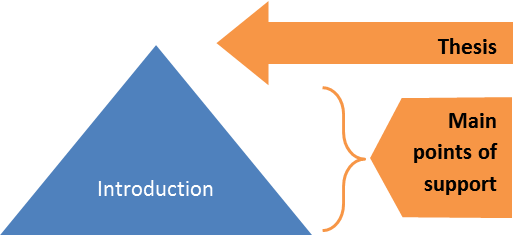
People at our school have been debating whether or not we should put drink machines in the locker rooms. I believe that putting in the machines will be good for our athletes, other students, and even the school. First, we all know that athletes need to stay hydrated to play well. Second, even a regular student would like to enjoy a sugary pick-me-up between classes. And even the school will benefit because drink machines can make money to pay for new gym equipment and upgrades. Let me show you why you should support putting the machines in the locker room.
Thesis near the end of the introduction
If you place your thesis here, your introduction will begin with your main ideas, and then focus down to your ‘point.
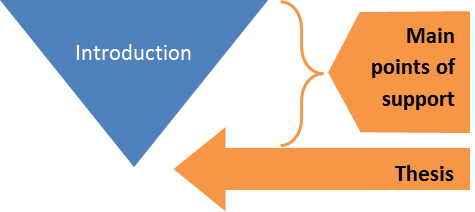
I love this school, and I sometimes see small problems I wish I could fix. For instance, I see our sports teams playing well, but sometimes giving up points in the 4 th quarter. I also see my friends in 4 th period with their heads on the desk; they are tired because they are out of energy, but it isn’t time for lunch. And I know we have been talking for weeks about how the new budget might cut out funds for gym equipment and upgrades. Fortunately, I have come up with a single solution to solve all of these problems: I believe that putting in the machines will be good for our athletes, other students, and even the school. Let me show you why this is such a good idea.
List of Terms
- Alliteration
- Amplification
- Anachronism
- Anthropomorphism
- Antonomasia
- APA Citation
- Aposiopesis
- Autobiography
- Bildungsroman
- Characterization
- Circumlocution
- Cliffhanger
- Comic Relief
- Connotation
- Deus ex machina
- Deuteragonist
- Doppelganger
- Double Entendre
- Dramatic irony
- Equivocation
- Extended Metaphor
- Figures of Speech
- Flash-forward
- Foreshadowing
- Intertextuality
- Juxtaposition
- Literary Device
- Malapropism
- Onomatopoeia
- Parallelism
- Pathetic Fallacy
- Personification
- Point of View
- Polysyndeton
- Protagonist
- Red Herring
- Rhetorical Device
- Rhetorical Question
- Science Fiction
- Self-Fulfilling Prophecy
- Synesthesia
- Turning Point
- Understatement
- Urban Legend
- Verisimilitude
- Essay Guide
- Cite This Website
explanatorythesis.com
Great Explanatory Thesis Esamples

How to Write a Thesis Statement for a Literary Analysis Essay
Many people would read a literature work for fun or purely educational purposes. However, it isn’t so fun when you have to formulate a thesis statement for a literary analysis essay. Find out everything you need to know about how to write a thesis for literary analysis.
What is a literary analysis essay?
A literary analysis essay is an essay that analyzes a literature work. A literature work can come in different forms ranging from poems to poetry. It is often an argument for or against a segment of the literary work. It is important to note, however, that a literary analysis is not merely a literature review. This kind of essay focuses on specific parts of a book and not the whole book in general. The focus could be a theme, plot setting, or character featured in the work.
Features of a Literary Analysis Thesis
- It Answers the Question of your Literary Analysis Essay
One of the most important features of a thesis statement for a literary essay is the need to answer the question of your literary analysis. A literary analysis essay generally aims to address thought-provoking questions. This could come as a plain question or an argument. Hence, what your thesis would do is to examine the manner through which your topic comes and address it.
- It is Concise
Your literary thesis statement should be concise and not too broad. Being broad goes beyond the number of sentences or words you use to relay your message. It concerns the area or field that you intend to analyze. Many things could be analyzed about literature no matter how short the work appears to be. Always remember that you must discuss every point mentioned in your thesis. It is for this reason that you should be careful while constructing your thesis statement. You don’t want to cover too many aspects that you do not give enough attention to the work. It is better to give quality work.
- It Features Facts about Literature
The primary feature of an argument-based essay is the need to make constant references to facts. More often than not, your thesis would have to point towards facts to back up your claims and arguments. It is important therefore that you make proper research concerning what your argument would be about before you begin to construct your thesis. As the writer of the essay, it is assumed that you know everything there is about the literary work. You hence must criticize, justify, analyze, and break down actions, plots, or themes in the work. This is why there are experts in certain fields of literary analysis. If you’re analyzing themes and devices used in the work, you must be well informed in concepts like onomatopoeia, oxymoron, pun, metaphor, etc.
- It is Argumentative
Your literary essay thesis should not aim to point out an already known fact about a book or literary piece. Everyone probably already knows that the book is interesting, fiction, nonfiction, or boring. What people would rather know is why certain acts behaved the way they did, and if they could have handled a situation better. They would like to argue if the theme of the poem is contrary to the poetic device employed. Your thesis should give room for debate and sharing of opinions.
- Its Primary Purpose is with the Book
Sometimes, writers get tempted to include scenery that does not correlate with the literature they’re analyzing. For instance, bringing an author’s personal life history into an analysis. It is important to note that in literary analysis, your work should be all about the work and facts related to it, and your thesis statement should not be any different. If the character or plot setting is not originally included in the work you’re analyzing, there should be no reason for you to involve it.
How to Write a Literary Analysis Thesis
To write the best thesis statement for a literary analysis essay, you need to follow certain procedures. Here is a step-by-step guide on how to write a literary analysis thesis.
- Understand the Work you want to Analyze
To get the right thesis for your literary essay, you need to first understand the work that you wish to understand. This is important for many reasons; your thesis has to be in context with the work even if you include external facts to back up your claims. You must read and understand the context of the literature work before you think of drafting a thesis statement.
- Draft out the Title of your Literary Essay
After you have understood the work you want to analyze, you can go ahead and draft out your topic. Remember that your topic should not be too broad, rather it should be concise and precise. This will help your thesis statement to be organized and less bulky.
- Write out what you want to Analyze from your Title
Once you’ve sorted what you want your topic to be, you need to write out what you want to analyze. For instance, if your essay topic is on the character in a book, you might want to analyze his emotional vulnerability. If you like you can include his gullibility, weaknesses, and strengths.
- Tell your Readers why you want to Analyze that Area
Why would you want to analyze a character’s vulnerability? Perhaps it affects the storyline of the book negatively, and if his character had been otherwise, the book just might be better. This is one given assumption as to why you may consider critically examining a character. Your reason for picking out a literary piece for analysis may be entirely different, depending on what you’re analyzing. Always remember that your thesis statement should be backed up with facts and not personal emotions.
Everything you need to know about how to write a thesis for literary analysis has been addressed in this article. The outcome of your thesis statement is determined from the moment that you formulate the idea to write a literary analysis essay. In writing a literary analysis thesis statement, you must be able to observe, analyze, and state the importance of a literary work. To get the best result, apply the guidelines here to your writing.

Leave a Reply Cancel reply
Your email address will not be published. Required fields are marked *
Have a language expert improve your writing
Run a free plagiarism check in 10 minutes, generate accurate citations for free.
- Knowledge Base
Methodology
- How to Write a Literature Review | Guide, Examples, & Templates
How to Write a Literature Review | Guide, Examples, & Templates
Published on January 2, 2023 by Shona McCombes . Revised on September 11, 2023.
What is a literature review? A literature review is a survey of scholarly sources on a specific topic. It provides an overview of current knowledge, allowing you to identify relevant theories, methods, and gaps in the existing research that you can later apply to your paper, thesis, or dissertation topic .
There are five key steps to writing a literature review:
- Search for relevant literature
- Evaluate sources
- Identify themes, debates, and gaps
- Outline the structure
- Write your literature review
A good literature review doesn’t just summarize sources—it analyzes, synthesizes , and critically evaluates to give a clear picture of the state of knowledge on the subject.
Instantly correct all language mistakes in your text
Upload your document to correct all your mistakes in minutes

Table of contents
What is the purpose of a literature review, examples of literature reviews, step 1 – search for relevant literature, step 2 – evaluate and select sources, step 3 – identify themes, debates, and gaps, step 4 – outline your literature review’s structure, step 5 – write your literature review, free lecture slides, other interesting articles, frequently asked questions, introduction.
- Quick Run-through
- Step 1 & 2
When you write a thesis , dissertation , or research paper , you will likely have to conduct a literature review to situate your research within existing knowledge. The literature review gives you a chance to:
- Demonstrate your familiarity with the topic and its scholarly context
- Develop a theoretical framework and methodology for your research
- Position your work in relation to other researchers and theorists
- Show how your research addresses a gap or contributes to a debate
- Evaluate the current state of research and demonstrate your knowledge of the scholarly debates around your topic.
Writing literature reviews is a particularly important skill if you want to apply for graduate school or pursue a career in research. We’ve written a step-by-step guide that you can follow below.

Receive feedback on language, structure, and formatting
Professional editors proofread and edit your paper by focusing on:
- Academic style
- Vague sentences
- Style consistency
See an example

Writing literature reviews can be quite challenging! A good starting point could be to look at some examples, depending on what kind of literature review you’d like to write.
- Example literature review #1: “Why Do People Migrate? A Review of the Theoretical Literature” ( Theoretical literature review about the development of economic migration theory from the 1950s to today.)
- Example literature review #2: “Literature review as a research methodology: An overview and guidelines” ( Methodological literature review about interdisciplinary knowledge acquisition and production.)
- Example literature review #3: “The Use of Technology in English Language Learning: A Literature Review” ( Thematic literature review about the effects of technology on language acquisition.)
- Example literature review #4: “Learners’ Listening Comprehension Difficulties in English Language Learning: A Literature Review” ( Chronological literature review about how the concept of listening skills has changed over time.)
You can also check out our templates with literature review examples and sample outlines at the links below.
Download Word doc Download Google doc
Before you begin searching for literature, you need a clearly defined topic .
If you are writing the literature review section of a dissertation or research paper, you will search for literature related to your research problem and questions .
Make a list of keywords
Start by creating a list of keywords related to your research question. Include each of the key concepts or variables you’re interested in, and list any synonyms and related terms. You can add to this list as you discover new keywords in the process of your literature search.
- Social media, Facebook, Instagram, Twitter, Snapchat, TikTok
- Body image, self-perception, self-esteem, mental health
- Generation Z, teenagers, adolescents, youth
Search for relevant sources
Use your keywords to begin searching for sources. Some useful databases to search for journals and articles include:
- Your university’s library catalogue
- Google Scholar
- Project Muse (humanities and social sciences)
- Medline (life sciences and biomedicine)
- EconLit (economics)
- Inspec (physics, engineering and computer science)
You can also use boolean operators to help narrow down your search.
Make sure to read the abstract to find out whether an article is relevant to your question. When you find a useful book or article, you can check the bibliography to find other relevant sources.
You likely won’t be able to read absolutely everything that has been written on your topic, so it will be necessary to evaluate which sources are most relevant to your research question.
For each publication, ask yourself:
- What question or problem is the author addressing?
- What are the key concepts and how are they defined?
- What are the key theories, models, and methods?
- Does the research use established frameworks or take an innovative approach?
- What are the results and conclusions of the study?
- How does the publication relate to other literature in the field? Does it confirm, add to, or challenge established knowledge?
- What are the strengths and weaknesses of the research?
Make sure the sources you use are credible , and make sure you read any landmark studies and major theories in your field of research.
You can use our template to summarize and evaluate sources you’re thinking about using. Click on either button below to download.
Take notes and cite your sources
As you read, you should also begin the writing process. Take notes that you can later incorporate into the text of your literature review.
It is important to keep track of your sources with citations to avoid plagiarism . It can be helpful to make an annotated bibliography , where you compile full citation information and write a paragraph of summary and analysis for each source. This helps you remember what you read and saves time later in the process.
Prevent plagiarism. Run a free check.
To begin organizing your literature review’s argument and structure, be sure you understand the connections and relationships between the sources you’ve read. Based on your reading and notes, you can look for:
- Trends and patterns (in theory, method or results): do certain approaches become more or less popular over time?
- Themes: what questions or concepts recur across the literature?
- Debates, conflicts and contradictions: where do sources disagree?
- Pivotal publications: are there any influential theories or studies that changed the direction of the field?
- Gaps: what is missing from the literature? Are there weaknesses that need to be addressed?
This step will help you work out the structure of your literature review and (if applicable) show how your own research will contribute to existing knowledge.
- Most research has focused on young women.
- There is an increasing interest in the visual aspects of social media.
- But there is still a lack of robust research on highly visual platforms like Instagram and Snapchat—this is a gap that you could address in your own research.
There are various approaches to organizing the body of a literature review. Depending on the length of your literature review, you can combine several of these strategies (for example, your overall structure might be thematic, but each theme is discussed chronologically).
Chronological
The simplest approach is to trace the development of the topic over time. However, if you choose this strategy, be careful to avoid simply listing and summarizing sources in order.
Try to analyze patterns, turning points and key debates that have shaped the direction of the field. Give your interpretation of how and why certain developments occurred.
If you have found some recurring central themes, you can organize your literature review into subsections that address different aspects of the topic.
For example, if you are reviewing literature about inequalities in migrant health outcomes, key themes might include healthcare policy, language barriers, cultural attitudes, legal status, and economic access.
Methodological
If you draw your sources from different disciplines or fields that use a variety of research methods , you might want to compare the results and conclusions that emerge from different approaches. For example:
- Look at what results have emerged in qualitative versus quantitative research
- Discuss how the topic has been approached by empirical versus theoretical scholarship
- Divide the literature into sociological, historical, and cultural sources
Theoretical
A literature review is often the foundation for a theoretical framework . You can use it to discuss various theories, models, and definitions of key concepts.
You might argue for the relevance of a specific theoretical approach, or combine various theoretical concepts to create a framework for your research.
Like any other academic text , your literature review should have an introduction , a main body, and a conclusion . What you include in each depends on the objective of your literature review.
The introduction should clearly establish the focus and purpose of the literature review.
Depending on the length of your literature review, you might want to divide the body into subsections. You can use a subheading for each theme, time period, or methodological approach.
As you write, you can follow these tips:
- Summarize and synthesize: give an overview of the main points of each source and combine them into a coherent whole
- Analyze and interpret: don’t just paraphrase other researchers — add your own interpretations where possible, discussing the significance of findings in relation to the literature as a whole
- Critically evaluate: mention the strengths and weaknesses of your sources
- Write in well-structured paragraphs: use transition words and topic sentences to draw connections, comparisons and contrasts
In the conclusion, you should summarize the key findings you have taken from the literature and emphasize their significance.
When you’ve finished writing and revising your literature review, don’t forget to proofread thoroughly before submitting. Not a language expert? Check out Scribbr’s professional proofreading services !
This article has been adapted into lecture slides that you can use to teach your students about writing a literature review.
Scribbr slides are free to use, customize, and distribute for educational purposes.
Open Google Slides Download PowerPoint
If you want to know more about the research process , methodology , research bias , or statistics , make sure to check out some of our other articles with explanations and examples.
- Sampling methods
- Simple random sampling
- Stratified sampling
- Cluster sampling
- Likert scales
- Reproducibility
Statistics
- Null hypothesis
- Statistical power
- Probability distribution
- Effect size
- Poisson distribution
Research bias
- Optimism bias
- Cognitive bias
- Implicit bias
- Hawthorne effect
- Anchoring bias
- Explicit bias
A literature review is a survey of scholarly sources (such as books, journal articles, and theses) related to a specific topic or research question .
It is often written as part of a thesis, dissertation , or research paper , in order to situate your work in relation to existing knowledge.
There are several reasons to conduct a literature review at the beginning of a research project:
- To familiarize yourself with the current state of knowledge on your topic
- To ensure that you’re not just repeating what others have already done
- To identify gaps in knowledge and unresolved problems that your research can address
- To develop your theoretical framework and methodology
- To provide an overview of the key findings and debates on the topic
Writing the literature review shows your reader how your work relates to existing research and what new insights it will contribute.
The literature review usually comes near the beginning of your thesis or dissertation . After the introduction , it grounds your research in a scholarly field and leads directly to your theoretical framework or methodology .
A literature review is a survey of credible sources on a topic, often used in dissertations , theses, and research papers . Literature reviews give an overview of knowledge on a subject, helping you identify relevant theories and methods, as well as gaps in existing research. Literature reviews are set up similarly to other academic texts , with an introduction , a main body, and a conclusion .
An annotated bibliography is a list of source references that has a short description (called an annotation ) for each of the sources. It is often assigned as part of the research process for a paper .
Cite this Scribbr article
If you want to cite this source, you can copy and paste the citation or click the “Cite this Scribbr article” button to automatically add the citation to our free Citation Generator.
McCombes, S. (2023, September 11). How to Write a Literature Review | Guide, Examples, & Templates. Scribbr. Retrieved June 18, 2024, from https://www.scribbr.com/dissertation/literature-review/
Is this article helpful?
Shona McCombes
Other students also liked, what is a theoretical framework | guide to organizing, what is a research methodology | steps & tips, how to write a research proposal | examples & templates, "i thought ai proofreading was useless but..".
I've been using Scribbr for years now and I know it's a service that won't disappoint. It does a good job spotting mistakes”

How to structure your PhD thesis
Organising your PhD thesis in a logical order is one of the crucial stages of your writing process. Here is a list of the individual components to include
Shama Prasada Kabekkodu

Created in partnership with

You may also like

Popular resources
.css-1txxx8u{overflow:hidden;max-height:81px;text-indent:0px;} The secrets to success as a provost
Using non verbal cues to build rapport with students, emotionally challenging research and researcher well-being, augmenting the doctoral thesis in preparation for a viva, how hard can it be testing ai detection tools.
The task of writing a PhD thesis is top of mind for many aspiring scholars. After all, completing one is no small task. And while these pieces of writing often share a standard format, this can differ slightly based on the requirements of your institution or subject. So what elements make up a PhD thesis?
A doctoral thesis usually contains:
- A title page
- Declarations from the candidate and supervisor
- A certificate from the candidate and supervisor
- A plagiarism report
- Acknowledgements
- A table of contents
- Abbreviations
- An abstract
Chapters typically cover:
- A general introduction
- Literature review
- Analysis of the gap in research with aims and objectives
- Materials and methods
- Summary and conclusion
- References or bibliography.
You should also include a list of papers you have published and any relevant achievements at the end.
An explanation of each of the components of a PhD dissertation
Title page: a PhD thesis starts with a title page that contains the complete title of the research work, the submitting university, names of the candidate and supervisor, affiliation and month and year of submission.
Abstract: this serves as a concise synopsis of the dissertation, covering the research context, purpose of the study or research questions, methodology, findings and conclusions. This section is usually one to two pages in length.
Table of contents: this page lists the thesis content and respective page numbers.
General introduction and literature review: this component is usually 20 to 40 pages long. It presents the readers with the primary material and discusses relevant published data. It provides an overview of pertinent literature related to the thesis such as texts that critically assess the existing literature to identify the gap in research and explain the need behind the study.
Aims and objectives: this section of the thesis is typically one to two pages long and describes the aims and objectives of the study. Structure them as three to four bullet points describing specific points that you will investigate. Approach this by thinking about what readers should understand by the end of the thesis. Ensure you:
- Give a clear explanation of the purpose and goals of your study
- Outline each aim concisely
- Explain how you will measure your objectives
- Ensure there is a clear connection between each aim
- Use verbs such as investigate, evaluate, explore, analyse and demonstrate.
Materials and methods: this section briefly explains how you have conducted the study and should include all the materials you used and procedures you implemented. For example, if your research involves working with chemicals, list the chemicals and instruments used, along with their catalogue numbers and manufacturers’ names. This section should also explicitly explain the methodology you used, step-by-step. Use the past tense while writing this section and do not describe any results or findings of the study yet.
Results: this section is sometimes called the “findings report” or “the experimental findings” (referring to data collection and analysis). Write the results concisely and in the past tense. Include text, figure and table infographics created with tools such as Microsoft PowerPoint, Adobe Illustrator and BioRender to visualise your data .
Discussion: this is a chance to discuss the results and compare the findings of your study with the initial hypothesis and existing knowledge. Focus on discussing interpretations, implications, limitations and recommendations here.
- Resources on academic writing for higher education staff
- Tips for writing a PhD dissertation: FAQs answered
- How to tackle the PhD dissertation
Summary and conclusion: this section should be shorter than the discussion and summarise your key findings. The summary and conclusion should be brief and engaging, allowing the reader to easily understand the major findings of the research work. Provide clear answers to the research questions, generate new knowledge and clarify the need for the study.
Future perspective: this section of the thesis (which is often combined with a summary or conclusion) talks about the study's limitations, if any, and indicates the directions for future studies based on your findings.
References or bibliography: the last section should include the list of articles, websites and other resources cited in the thesis.
Always remember that, depending on the department, university or field of study, you might have to follow specific guidelines on how to organise your PhD thesis. Ensure you consult your supervisor or academic department if you have any doubts.
Shama Prasada Kabekkodu is a professor and head of cell and molecular biology at Manipal School of Life Sciences, Manipal Academy of Higher Education, India.
If you would like advice and insight from academics and university staff delivered direct to your inbox each week, sign up for the Campus newsletter .
The secrets to success as a provost
Emotions and learning: what role do emotions play in how and why students learn, the podcast: bringing an outsider’s eye to primary sources, a diy guide to starting your own journal, formative, summative or diagnostic assessment a guide, harnessing the power of data to drive student success.
Register for free
and unlock a host of features on the THE site

Introductions
What this handout is about.
This handout will explain the functions of introductions, offer strategies for creating effective introductions, and provide some examples of less effective introductions to avoid.
The role of introductions
Introductions and conclusions can be the most difficult parts of papers to write. Usually when you sit down to respond to an assignment, you have at least some sense of what you want to say in the body of your paper. You might have chosen a few examples you want to use or have an idea that will help you answer the main question of your assignment; these sections, therefore, may not be as hard to write. And it’s fine to write them first! But in your final draft, these middle parts of the paper can’t just come out of thin air; they need to be introduced and concluded in a way that makes sense to your reader.
Your introduction and conclusion act as bridges that transport your readers from their own lives into the “place” of your analysis. If your readers pick up your paper about education in the autobiography of Frederick Douglass, for example, they need a transition to help them leave behind the world of Chapel Hill, television, e-mail, and The Daily Tar Heel and to help them temporarily enter the world of nineteenth-century American slavery. By providing an introduction that helps your readers make a transition between their own world and the issues you will be writing about, you give your readers the tools they need to get into your topic and care about what you are saying. Similarly, once you’ve hooked your readers with the introduction and offered evidence to prove your thesis, your conclusion can provide a bridge to help your readers make the transition back to their daily lives. (See our handout on conclusions .)
Note that what constitutes a good introduction may vary widely based on the kind of paper you are writing and the academic discipline in which you are writing it. If you are uncertain what kind of introduction is expected, ask your instructor.
Why bother writing a good introduction?
You never get a second chance to make a first impression. The opening paragraph of your paper will provide your readers with their initial impressions of your argument, your writing style, and the overall quality of your work. A vague, disorganized, error-filled, off-the-wall, or boring introduction will probably create a negative impression. On the other hand, a concise, engaging, and well-written introduction will start your readers off thinking highly of you, your analytical skills, your writing, and your paper.
Your introduction is an important road map for the rest of your paper. Your introduction conveys a lot of information to your readers. You can let them know what your topic is, why it is important, and how you plan to proceed with your discussion. In many academic disciplines, your introduction should contain a thesis that will assert your main argument. Your introduction should also give the reader a sense of the kinds of information you will use to make that argument and the general organization of the paragraphs and pages that will follow. After reading your introduction, your readers should not have any major surprises in store when they read the main body of your paper.
Ideally, your introduction will make your readers want to read your paper. The introduction should capture your readers’ interest, making them want to read the rest of your paper. Opening with a compelling story, an interesting question, or a vivid example can get your readers to see why your topic matters and serve as an invitation for them to join you for an engaging intellectual conversation (remember, though, that these strategies may not be suitable for all papers and disciplines).
Strategies for writing an effective introduction
Start by thinking about the question (or questions) you are trying to answer. Your entire essay will be a response to this question, and your introduction is the first step toward that end. Your direct answer to the assigned question will be your thesis, and your thesis will likely be included in your introduction, so it is a good idea to use the question as a jumping off point. Imagine that you are assigned the following question:
Drawing on the Narrative of the Life of Frederick Douglass , discuss the relationship between education and slavery in 19th-century America. Consider the following: How did white control of education reinforce slavery? How did Douglass and other enslaved African Americans view education while they endured slavery? And what role did education play in the acquisition of freedom? Most importantly, consider the degree to which education was or was not a major force for social change with regard to slavery.
You will probably refer back to your assignment extensively as you prepare your complete essay, and the prompt itself can also give you some clues about how to approach the introduction. Notice that it starts with a broad statement and then narrows to focus on specific questions from the book. One strategy might be to use a similar model in your own introduction—start off with a big picture sentence or two and then focus in on the details of your argument about Douglass. Of course, a different approach could also be very successful, but looking at the way the professor set up the question can sometimes give you some ideas for how you might answer it. (See our handout on understanding assignments for additional information on the hidden clues in assignments.)
Decide how general or broad your opening should be. Keep in mind that even a “big picture” opening needs to be clearly related to your topic; an opening sentence that said “Human beings, more than any other creatures on earth, are capable of learning” would be too broad for our sample assignment about slavery and education. If you have ever used Google Maps or similar programs, that experience can provide a helpful way of thinking about how broad your opening should be. Imagine that you’re researching Chapel Hill. If what you want to find out is whether Chapel Hill is at roughly the same latitude as Rome, it might make sense to hit that little “minus” sign on the online map until it has zoomed all the way out and you can see the whole globe. If you’re trying to figure out how to get from Chapel Hill to Wrightsville Beach, it might make more sense to zoom in to the level where you can see most of North Carolina (but not the rest of the world, or even the rest of the United States). And if you are looking for the intersection of Ridge Road and Manning Drive so that you can find the Writing Center’s main office, you may need to zoom all the way in. The question you are asking determines how “broad” your view should be. In the sample assignment above, the questions are probably at the “state” or “city” level of generality. When writing, you need to place your ideas in context—but that context doesn’t generally have to be as big as the whole galaxy!
Try writing your introduction last. You may think that you have to write your introduction first, but that isn’t necessarily true, and it isn’t always the most effective way to craft a good introduction. You may find that you don’t know precisely what you are going to argue at the beginning of the writing process. It is perfectly fine to start out thinking that you want to argue a particular point but wind up arguing something slightly or even dramatically different by the time you’ve written most of the paper. The writing process can be an important way to organize your ideas, think through complicated issues, refine your thoughts, and develop a sophisticated argument. However, an introduction written at the beginning of that discovery process will not necessarily reflect what you wind up with at the end. You will need to revise your paper to make sure that the introduction, all of the evidence, and the conclusion reflect the argument you intend. Sometimes it’s easiest to just write up all of your evidence first and then write the introduction last—that way you can be sure that the introduction will match the body of the paper.
Don’t be afraid to write a tentative introduction first and then change it later. Some people find that they need to write some kind of introduction in order to get the writing process started. That’s fine, but if you are one of those people, be sure to return to your initial introduction later and rewrite if necessary.
Open with something that will draw readers in. Consider these options (remembering that they may not be suitable for all kinds of papers):
- an intriguing example —for example, Douglass writes about a mistress who initially teaches him but then ceases her instruction as she learns more about slavery.
- a provocative quotation that is closely related to your argument —for example, Douglass writes that “education and slavery were incompatible with each other.” (Quotes from famous people, inspirational quotes, etc. may not work well for an academic paper; in this example, the quote is from the author himself.)
- a puzzling scenario —for example, Frederick Douglass says of slaves that “[N]othing has been left undone to cripple their intellects, darken their minds, debase their moral nature, obliterate all traces of their relationship to mankind; and yet how wonderfully they have sustained the mighty load of a most frightful bondage, under which they have been groaning for centuries!” Douglass clearly asserts that slave owners went to great lengths to destroy the mental capacities of slaves, yet his own life story proves that these efforts could be unsuccessful.
- a vivid and perhaps unexpected anecdote —for example, “Learning about slavery in the American history course at Frederick Douglass High School, students studied the work slaves did, the impact of slavery on their families, and the rules that governed their lives. We didn’t discuss education, however, until one student, Mary, raised her hand and asked, ‘But when did they go to school?’ That modern high school students could not conceive of an American childhood devoid of formal education speaks volumes about the centrality of education to American youth today and also suggests the significance of the deprivation of education in past generations.”
- a thought-provoking question —for example, given all of the freedoms that were denied enslaved individuals in the American South, why does Frederick Douglass focus his attentions so squarely on education and literacy?
Pay special attention to your first sentence. Start off on the right foot with your readers by making sure that the first sentence actually says something useful and that it does so in an interesting and polished way.
How to evaluate your introduction draft
Ask a friend to read your introduction and then tell you what they expect the paper will discuss, what kinds of evidence the paper will use, and what the tone of the paper will be. If your friend is able to predict the rest of your paper accurately, you probably have a good introduction.
Five kinds of less effective introductions
1. The placeholder introduction. When you don’t have much to say on a given topic, it is easy to create this kind of introduction. Essentially, this kind of weaker introduction contains several sentences that are vague and don’t really say much. They exist just to take up the “introduction space” in your paper. If you had something more effective to say, you would probably say it, but in the meantime this paragraph is just a place holder.
Example: Slavery was one of the greatest tragedies in American history. There were many different aspects of slavery. Each created different kinds of problems for enslaved people.
2. The restated question introduction. Restating the question can sometimes be an effective strategy, but it can be easy to stop at JUST restating the question instead of offering a more specific, interesting introduction to your paper. The professor or teaching assistant wrote your question and will be reading many essays in response to it—they do not need to read a whole paragraph that simply restates the question.
Example: The Narrative of the Life of Frederick Douglass discusses the relationship between education and slavery in 19th century America, showing how white control of education reinforced slavery and how Douglass and other enslaved African Americans viewed education while they endured. Moreover, the book discusses the role that education played in the acquisition of freedom. Education was a major force for social change with regard to slavery.
3. The Webster’s Dictionary introduction. This introduction begins by giving the dictionary definition of one or more of the words in the assigned question. Anyone can look a word up in the dictionary and copy down what Webster says. If you want to open with a discussion of an important term, it may be far more interesting for you (and your reader) if you develop your own definition of the term in the specific context of your class and assignment. You may also be able to use a definition from one of the sources you’ve been reading for class. Also recognize that the dictionary is also not a particularly authoritative work—it doesn’t take into account the context of your course and doesn’t offer particularly detailed information. If you feel that you must seek out an authority, try to find one that is very relevant and specific. Perhaps a quotation from a source reading might prove better? Dictionary introductions are also ineffective simply because they are so overused. Instructors may see a great many papers that begin in this way, greatly decreasing the dramatic impact that any one of those papers will have.
Example: Webster’s dictionary defines slavery as “the state of being a slave,” as “the practice of owning slaves,” and as “a condition of hard work and subjection.”
4. The “dawn of man” introduction. This kind of introduction generally makes broad, sweeping statements about the relevance of this topic since the beginning of time, throughout the world, etc. It is usually very general (similar to the placeholder introduction) and fails to connect to the thesis. It may employ cliches—the phrases “the dawn of man” and “throughout human history” are examples, and it’s hard to imagine a time when starting with one of these would work. Instructors often find them extremely annoying.
Example: Since the dawn of man, slavery has been a problem in human history.
5. The book report introduction. This introduction is what you had to do for your elementary school book reports. It gives the name and author of the book you are writing about, tells what the book is about, and offers other basic facts about the book. You might resort to this sort of introduction when you are trying to fill space because it’s a familiar, comfortable format. It is ineffective because it offers details that your reader probably already knows and that are irrelevant to the thesis.
Example: Frederick Douglass wrote his autobiography, Narrative of the Life of Frederick Douglass, An American Slave , in the 1840s. It was published in 1986 by Penguin Books. In it, he tells the story of his life.
And now for the conclusion…
Writing an effective introduction can be tough. Try playing around with several different options and choose the one that ends up sounding best to you!
Just as your introduction helps readers make the transition to your topic, your conclusion needs to help them return to their daily lives–but with a lasting sense of how what they have just read is useful or meaningful. Check out our handout on conclusions for tips on ending your paper as effectively as you began it!
Works consulted
We consulted these works while writing this handout. This is not a comprehensive list of resources on the handout’s topic, and we encourage you to do your own research to find additional publications. Please do not use this list as a model for the format of your own reference list, as it may not match the citation style you are using. For guidance on formatting citations, please see the UNC Libraries citation tutorial . We revise these tips periodically and welcome feedback.
Douglass, Frederick. 1995. Narrative of the Life of Frederick Douglass, an American Slave, Written by Himself . New York: Dover.
You may reproduce it for non-commercial use if you use the entire handout and attribute the source: The Writing Center, University of North Carolina at Chapel Hill
Make a Gift
Purdue Online Writing Lab Purdue OWL® College of Liberal Arts
Graduate Writing Overview

Welcome to the Purdue OWL
This page is brought to you by the OWL at Purdue University. When printing this page, you must include the entire legal notice.
Copyright ©1995-2018 by The Writing Lab & The OWL at Purdue and Purdue University. All rights reserved. This material may not be published, reproduced, broadcast, rewritten, or redistributed without permission. Use of this site constitutes acceptance of our terms and conditions of fair use.
Here we present four vidcasts that offer a broad introductory overview of graduate writing. In this context, it is helpful to think about writing as a conversation , a process , a social endeavor , and a disciplinary undertaking . Stay tuned as we continue to publish these vidcasts!
Writing at the graduate level is quite different from writing at the undergraduate level. As emerging scholars, graduate writers will need to become well-versed in the scholarly conversations taking place in the journals and at the conferences within their field. Where undergraduate writers may find themselves primarily writing for their professor as audience and to show mastery of subject matter as a purpose, graduate writers’ audience will be their colleagues in the field, and their purpose will be to engage in conversation with and to disseminate new research to those colleagues. A graduate writer’s identity as scholar requires a concurrent identity as writer.
Materials in this section cover a range of topics relevant to graduate-level writing and to the process of becoming a scholarly writer within a particular field. Two sets of vidcasts fall in the category of Intensive Writing Experience (IWE). An IWE is a concentrated program aimed at a particular group of graduate students (e.g., those new to graduate writing or those writing theses and dissertations). These programs ask writers to learn about and engage with information about and strategies to apply to writing that they can then use in their own work. The Introduction to Graduate Writing vidcast series explores how writing is a conversation, a process, a social endeavor, and discipline specific. The IWE for Thesis and Dissertation writers offers material on how to set goals for and remain motivated during a long-term project. It covers topics relevant to drafting and revising documents, such as reverse outlining, sentence concision, and flow in scholarly writing.
In addition to the vidcasts, this section of the OWL houses a number of handouts specific to graduate writing on topics such as style or organization and on genres such as literature reviews and conference proposals. These materials offer explanations and samples of the particular topic or genre being covered in the handout.

AI Generator
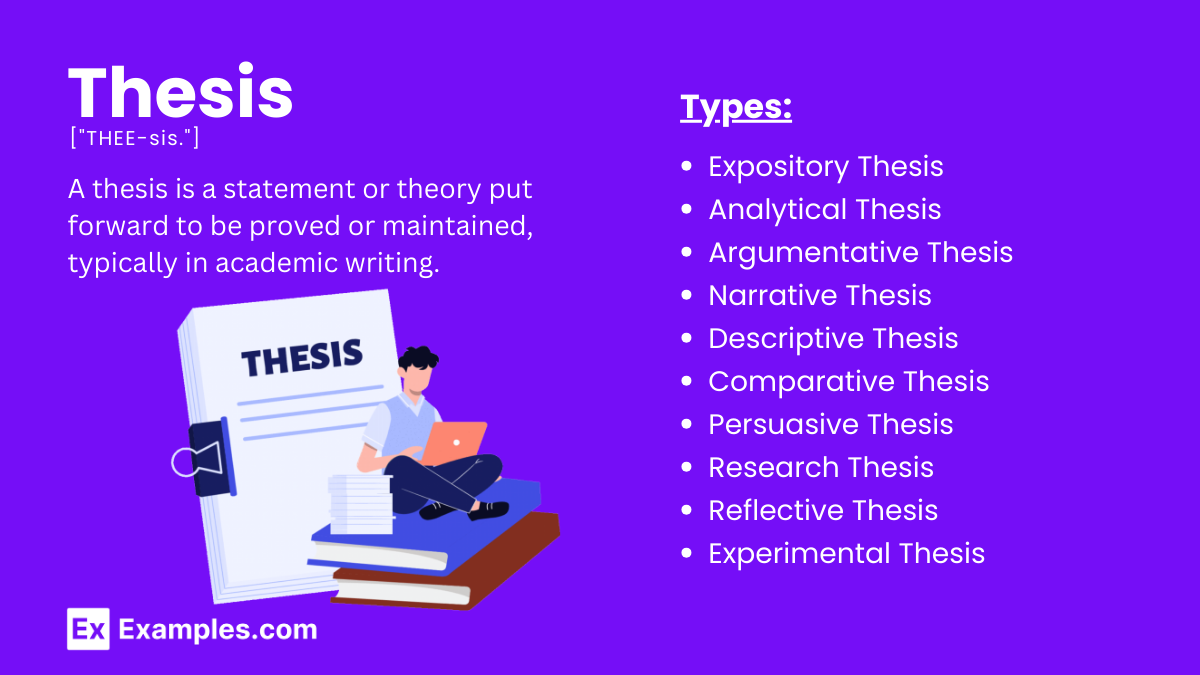
A thesis is a comprehensive research paper that presents a central argument or claim supported by evidence. Typically written by students pursuing advanced degrees, a thesis demonstrates a deep understanding of a subject. It includes a clear research question, literature review, methodology, analysis, and conclusions. The process enhances critical thinking, research skills , and subject expertise, culminating in a significant academic contribution.
Thesis paper . Many students tend to fear this word and there is a good reason as to why they do. You may already have tried making a thesis before and at some point, you would also realize the trial and error stage of making one.
What Is a Thesis?
A thesis a research paper writing that is made for a purpose. Thesis papers consists of a research statement , a kind of statement , a theory, a purpose. The thesis is made in order to prove your theory and make it into a fact. There are a lot of kinds of thesis, but the most common thesis kinds are analytical thesis, an argumentative thesis and an explanatory thesis.
Types of Thesis
Analytical thesis.
An analytical thesis breaks down an issue or idea into its component parts, evaluates the topic, and presents this breakdown and evaluation to the audience. It is often used in literature, history, and social sciences.
Expository Thesis
An expository thesis explains a topic to the audience. It provides a comprehensive overview of a subject, presenting facts and analysis without personal opinion. This type is common in science and technical writing.
Argumentative Thesis
An argumentative thesis makes a claim about a topic and justifies this claim with specific evidence. The goal is to persuade the reader of a particular viewpoint. This type is prevalent in fields like philosophy, political science, and law.
Narrative Thesis
A narrative thesis tells a story or recounts an event. It includes personal experiences or detailed descriptions of events to support the main argument. This type is often used in creative writing and autobiographies.
Comparative Thesis
A comparative thesis compares and contrasts two or more subjects, evaluating their similarities and differences. It is commonly used in literature, history, and social sciences to draw meaningful conclusions.
Descriptive Thesis
A descriptive thesis provides a detailed description of a topic without arguing a specific point. It paints a vivid picture of the subject, often used in fields like anthropology and sociology to explore cultural phenomena.

Empirical Thesis
An empirical thesis is based on original research and data collection. It involves experiments, surveys, or observations to answer a specific research question. This type is typical in natural and social sciences.
Examples of Thesis
Thesis examples in literature, 1: analysis of a single work.
Title: “The Use of Symbolism in ‘The Great Gatsby’ by F. Scott Fitzgerald”
Thesis Statement: In F. Scott Fitzgerald’s ‘The Great Gatsby,’ the use of symbolism, particularly through the green light at the end of Daisy’s dock, the eyes of Doctor T. J. Eckleburg, and the Valley of Ashes, serves to illustrate the overarching themes of the American Dream, moral decay, and the quest for identity.
2: Comparative Analysis
Title: “The Role of Women in ‘Pride and Prejudice’ by Jane Austen and ‘Jane Eyre’ by Charlotte Brontë”
Thesis Statement: While both Jane Austen’s ‘Pride and Prejudice’ and Charlotte Brontë’s ‘Jane Eyre’ critique the limited roles and expectations of women in 19th-century British society, Austen’s Elizabeth Bennet and Brontë’s Jane Eyre embody different forms of rebellion against societal norms, highlighting the evolving perception of women’s independence and self-worth.
3: Thematic Analysis
Title: “Exploring the Theme of Isolation in ‘Frankenstein’ by Mary Shelley”
Thesis Statement: Mary Shelley’s ‘Frankenstein’ explores the theme of isolation through the experiences of Victor Frankenstein and his creation, the monster, demonstrating how isolation leads to destructive consequences for both individuals and society.
4: Character Analysis
Title: “The Evolution of Hamlet’s Character in William Shakespeare’s ‘Hamlet'”
Thesis Statement: In William Shakespeare’s ‘Hamlet,’ the protagonist undergoes a significant transformation from a grief-stricken and indecisive prince to a determined and introspective avenger, reflecting the complexities of human nature and the impact of existential contemplation.
5: Genre Analysis
Title: “Gothic Elements in ‘Wuthering Heights’ by Emily Brontë”
Thesis Statement: Emily Brontë’s ‘Wuthering Heights’ employs key elements of Gothic literature, including a brooding atmosphere, supernatural occurrences, and the exploration of human psychology, to create a haunting and timeless tale of passion and revenge.
6: Symbolic Analysis
Title: “The Symbolism of the Green Light in ‘The Great Gatsby’ by F. Scott Fitzgerald”
Thesis Statement: The green light in F. Scott Fitzgerald’s ‘The Great Gatsby’ symbolizes Gatsby’s unattainable dreams and the elusive nature of the American Dream, reflecting the broader themes of hope, disillusionment, and the pursuit of an idealized future.
7: Historical Context
Title: “Historical Influences on George Orwell’s ‘1984’”
Thesis Statement: George Orwell’s ‘1984’ draws heavily on the political climate of the early 20th century, particularly the rise of totalitarian regimes and the impact of World War II, to present a dystopian vision of a future where government surveillance and propaganda control every aspect of life.
8: Feminist Critique
Title: “Feminist Perspectives in ‘The Handmaid’s Tale’ by Margaret Atwood”
Thesis Statement: Margaret Atwood’s ‘The Handmaid’s Tale’ critiques the patriarchal structures of contemporary society by depicting a dystopian world where women’s rights are stripped away, illustrating the extreme consequences of gender oppression and the resilience of female solidarity.
9: Psychoanalytic Criticism
Title: “Freudian Elements in ‘The Turn of the Screw’ by Henry James”
Thesis Statement: Henry James’s ‘The Turn of the Screw’ can be interpreted through a Freudian lens, where the governess’s experiences and the ambiguous nature of the ghosts reflect deep-seated psychological conflicts and repressed desires, highlighting the novella’s exploration of the human psyche.
10: Postcolonial Analysis
Title: “Postcolonial Themes in ‘Things Fall Apart’ by Chinua Achebe”
Thesis Statement: Chinua Achebe’s ‘Things Fall Apart’ addresses postcolonial themes by portraying the clash between traditional Igbo society and British colonial forces, illustrating the devastating effects of colonialism on indigenous cultures and the struggle for cultural identity and autonomy.
Thesis Examples for Essays
1: persuasive essay.
Topic: “The Importance of Renewable Energy”
Thesis Statement: Governments around the world should invest heavily in renewable energy sources like solar and wind power to reduce dependency on fossil fuels, combat climate change, and create sustainable job opportunities.
2: Analytical Essay
Topic: “The Symbolism in ‘The Great Gatsby’ by F. Scott Fitzgerald”
Thesis Statement: In ‘The Great Gatsby,’ F. Scott Fitzgerald uses the symbols of the green light, the eyes of Doctor T. J. Eckleburg, and the Valley of Ashes to illustrate the moral and social decay of America during the Roaring Twenties.
3: Expository Essay
Topic: “The Impact of Social Media on Teenagers”
Thesis Statement: Social media has significantly impacted teenagers’ mental health, social skills, and academic performance, both positively and negatively, necessitating a balanced approach to its usage.
4: Compare and Contrast Essay
Topic: “Public vs. Private School Education”
Thesis Statement: While public schools offer a more diverse social environment and extracurricular opportunities, private schools provide smaller class sizes and specialized curriculums, making the choice dependent on individual student needs and family priorities.
5: Cause and Effect Essay
Topic: “The Causes and Effects of the Rise in Obesity Rates”
Thesis Statement: The rise in obesity rates can be attributed to poor dietary habits, sedentary lifestyles, and genetic factors, leading to serious health issues such as diabetes, heart disease, and decreased life expectancy.
6: Narrative Essay
Topic: “A Life-Changing Experience”
Thesis Statement: My trip to volunteer at a rural school in Kenya was a life-changing experience that taught me the value of education, the importance of cultural exchange, and the power of empathy and compassion.
7: Argumentative Essay
Topic: “The Necessity of Free College Education”
Thesis Statement: Free college education is essential for ensuring equal opportunities for all, reducing student debt burdens, and fostering a more educated and productive workforce.
8: Descriptive Essay
Topic: “The Beauty of a Sunset”
Thesis Statement: A sunset, with its vibrant hues and serene ambiance, evokes a sense of peace and reflection, illustrating nature’s ability to inspire awe and tranquility in our daily lives.
9: Definition Essay
Topic: “What is Happiness?”
Thesis Statement: Happiness is a complex and multifaceted emotion characterized by feelings of contentment, fulfillment, and joy, influenced by both internal factors like mindset and external factors such as relationships and achievements.
10: Process Essay
Topic: “How to Bake the Perfect Chocolate Cake”
Thesis Statement: Baking the perfect chocolate cake involves selecting high-quality ingredients, precisely following the recipe, and understanding the nuances of baking techniques, from mixing to temperature control.
Thesis Examples for Argumentative Essay
1: gun control.
Topic: “Stricter Gun Control Laws”
Thesis Statement: Stricter gun control laws are necessary to reduce gun violence in the United States, as evidenced by lower rates of gun-related deaths in countries with stringent regulations.
2: Climate Change
Topic: “Addressing Climate Change”
Thesis Statement: To effectively combat climate change, governments worldwide must implement aggressive policies to reduce carbon emissions, invest in renewable energy, and promote sustainable practices.
3: Animal Testing
Topic: “Ban on Animal Testing”
Thesis Statement: Animal testing for cosmetics should be banned globally due to its ethical implications, the availability of alternative testing methods, and the questionable reliability of animal-based results for human safety.
4: Education Reform
Topic: “Standardized Testing in Schools”
Thesis Statement: Standardized testing should be eliminated in schools as it narrows the curriculum, causes undue stress to students, and fails to accurately measure a student’s potential and abilities.
5: Universal Basic Income
Topic: “Implementing Universal Basic Income”
Thesis Statement: Implementing a universal basic income would help alleviate poverty, reduce income inequality, and provide financial stability in an increasingly automated and unpredictable job market.
6: Health Care
Topic: “Universal Health Care”
Thesis Statement: Universal health care should be adopted in the United States to ensure that all citizens have access to essential medical services, reduce overall healthcare costs, and improve public health outcomes.
7: Immigration Policy
Topic: “Reforming Immigration Policies”
Thesis Statement: Comprehensive immigration reform is essential to address undocumented immigration, protect human rights, and contribute to economic growth by recognizing the contributions of immigrants to society.
8: Death Penalty
Topic: “Abolishing the Death Penalty”
Thesis Statement: The death penalty should be abolished as it is an inhumane practice, prone to judicial errors, and has not been proven to deter crime more effectively than life imprisonment.
9: Social Media Regulation
Topic: “Regulating Social Media Platforms”
Thesis Statement: Social media platforms should be regulated to prevent the spread of misinformation, protect user privacy, and reduce the negative impact on mental health, particularly among adolescents.
10: College Tuition
Topic: “Free College Tuition”
Thesis Statement: Providing free college tuition at public universities would increase access to higher education, reduce student debt, and help create a more educated and skilled workforce to meet future economic demands.
Thesis Examples for Research Papers
1: environmental science.
Topic: “Impact of Plastic Pollution on Marine Life”
Thesis Statement: Plastic pollution in the oceans is causing significant harm to marine life, leading to ingestion and entanglement of plastic debris, disruption of ecosystems, and bioaccumulation of toxic substances in the food chain.
2: Psychology
Topic: “Effects of Social Media on Adolescent Mental Health”
Thesis Statement: Excessive use of social media negatively impacts adolescent mental health by increasing the risk of anxiety, depression, and poor sleep quality, while also contributing to body image issues and cyberbullying.
3: Education
Topic: “Benefits of Bilingual Education Programs”
Thesis Statement: Bilingual education programs enhance cognitive abilities, improve academic performance, and promote cultural awareness, making them a valuable approach in the increasingly globalized and multicultural society.
4: Public Health
Topic: “Addressing the Obesity Epidemic”
Thesis Statement: Addressing the obesity epidemic requires a multifaceted approach that includes implementing public health campaigns, promoting healthy eating habits, increasing physical activity, and regulating food advertising targeted at children.
5: Economics
Topic: “Universal Basic Income and Economic Stability”
Thesis Statement: Implementing a universal basic income can provide economic stability by reducing poverty, ensuring a safety net during economic downturns, and stimulating consumer spending, thereby supporting overall economic growth.
6: Political Science
Topic: “Impact of Voter ID Laws on Voter Turnout”
Thesis Statement: Voter ID laws disproportionately reduce voter turnout among minority and low-income populations, undermining the democratic process and exacerbating existing inequalities in political participation.
7: Sociology
Topic: “Gender Stereotypes in Media Representation”
Thesis Statement: Media representation perpetuates gender stereotypes by consistently portraying men and women in traditional roles, which reinforces societal norms and limits the opportunities for gender equality.
8: Technology
Topic: “Artificial Intelligence in Healthcare”
Thesis Statement: The integration of artificial intelligence in healthcare can improve patient outcomes, enhance diagnostic accuracy, and streamline administrative processes, but it also raises ethical concerns regarding data privacy and the potential for job displacement.
Topic: “Causes and Consequences of the American Civil War”
Thesis Statement: The American Civil War was primarily caused by deep-seated economic, social, and political differences between the North and South, particularly over the issue of slavery, and it resulted in significant social and political changes, including the abolition of slavery and the reconstruction of the South.
10: Environmental Policy
Topic: “Renewable Energy Policies and Their Effectiveness”
Thesis Statement: Renewable energy policies, such as subsidies for solar and wind power and carbon pricing, are effective in reducing greenhouse gas emissions and promoting sustainable energy sources, but their success depends on comprehensive implementation and international cooperation.
Thesis Examples for Informative Essay
Topic: “The Water Cycle”
Thesis Statement: The water cycle, which includes processes such as evaporation, condensation, precipitation, and infiltration, is essential for distributing water across the Earth’s surface and maintaining ecological balance.
2: Health and Wellness
Topic: “The Benefits of Regular Exercise”
Thesis Statement: Regular exercise is crucial for maintaining physical health, improving mental well-being, and reducing the risk of chronic diseases such as obesity, diabetes, and cardiovascular conditions.
3: Technology
Topic: “The Development of Artificial Intelligence”
Thesis Statement: The development of artificial intelligence has progressed from simple machine learning algorithms to complex neural networks capable of performing tasks such as natural language processing, image recognition, and autonomous driving.
Topic: “The Causes and Effects of the American Civil Rights Movement”
Thesis Statement: The American Civil Rights Movement was driven by factors such as racial segregation, economic disparity, and political disenfranchisement, leading to significant legislative and social changes that improved the rights and freedoms of African Americans.
5: Education
Topic: “The Montessori Method of Education”
Thesis Statement: The Montessori method of education, developed by Dr. Maria Montessori, emphasizes self-directed learning, hands-on activities, and collaborative play, fostering independence and critical thinking skills in young children.
6: Sociology
Topic: “The Impact of Urbanization on Community Life”
Thesis Statement: Urbanization significantly impacts community life by altering social structures, increasing economic opportunities, and presenting challenges such as overcrowding, pollution, and loss of green spaces.
7: Environmental Policy
Topic: “The Role of Renewable Energy in Combating Climate Change”
Thesis Statement: Renewable energy sources, such as solar, wind, and hydroelectric power, play a critical role in combating climate change by reducing greenhouse gas emissions and providing sustainable alternatives to fossil fuels.
8: Business
Topic: “The Rise of Gig Economy”
Thesis Statement: The rise of the gig economy has transformed the labor market by offering flexible work opportunities, fostering entrepreneurship, and posing challenges such as job insecurity and lack of benefits for workers.
9: Psychology
Topic: “The Importance of Sleep for Cognitive Function”
Thesis Statement: Adequate sleep is essential for cognitive function, memory consolidation, and emotional regulation, with chronic sleep deprivation leading to impaired mental performance and increased risk of mental health disorders.
10: Cultural Studies
Topic: “The Influence of Japanese Anime on Global Pop Culture”
Thesis Statement: Japanese anime has significantly influenced global pop culture by shaping trends in fashion, art, and storytelling, and fostering a dedicated international fanbase that celebrates its unique aesthetic and thematic elements.
Thesis Examples for Synthesis Essay
1: climate change.
Topic: “Combating Climate Change through Policy and Innovation”
Thesis Statement: Combating climate change requires a multifaceted approach that includes stringent environmental policies, investment in renewable energy technologies, and community-based initiatives to reduce carbon footprints, integrating efforts from government, industry, and society.
2: Education
Topic: “Balancing Technology and Traditional Teaching Methods in Education”
Thesis Statement: A balanced approach to education that combines the benefits of technology, such as interactive learning tools and online resources, with traditional teaching methods, like face-to-face instruction and hands-on activities, can enhance student engagement and academic achievement.
Topic: “Addressing the Opioid Crisis through Comprehensive Strategies”
Thesis Statement: Addressing the opioid crisis requires comprehensive strategies that include better access to addiction treatment programs, stricter regulations on prescription opioids, and increased public awareness campaigns to educate communities about the risks of opioid misuse.
4: Technology
Topic: “The Impact of Social Media on Political Mobilization”
Thesis Statement: Social media has revolutionized political mobilization by providing platforms for grassroots campaigns, enabling real-time communication, and fostering civic engagement, but it also poses challenges such as the spread of misinformation and echo chambers.
5: Business
Topic: “Corporate Social Responsibility and Its Impact on Brand Loyalty”
Thesis Statement: Corporate social responsibility (CSR) initiatives, when genuinely implemented, can significantly enhance brand loyalty by aligning company values with consumer expectations, fostering trust, and contributing positively to societal well-being.
Topic: “The Role of Gender Stereotypes in Media Representation”
Thesis Statement: Media representation perpetuates gender stereotypes by consistently depicting men and women in traditional roles, which influences societal perceptions and expectations, but progressive portrayals are gradually challenging these norms and promoting gender equality.
Topic: “Sustainable Urban Development and Green Infrastructure”
Thesis Statement: Sustainable urban development that incorporates green infrastructure, such as green roofs, urban gardens, and eco-friendly public transportation, is essential for mitigating environmental impacts, improving public health, and enhancing the quality of urban life.
8: Psychology
Topic: “The Effects of Mindfulness Practices on Mental Health”
Thesis Statement: Mindfulness practices, including meditation, yoga, and mindful breathing, have been shown to significantly improve mental health by reducing stress, enhancing emotional regulation, and promoting overall well-being, supported by a growing body of scientific research.
9: Economics
Topic: “Universal Basic Income as a Solution to Economic Inequality”
Thesis Statement: Universal Basic Income (UBI) presents a viable solution to economic inequality by providing financial security, reducing poverty, and supporting economic stability, though it requires careful consideration of funding mechanisms and potential societal impacts.
10: Public Health
Topic: “The Importance of Vaccination Programs in Preventing Epidemics”
Thesis Statement: Vaccination programs are crucial for preventing epidemics, protecting public health, and achieving herd immunity, as evidenced by the successful eradication of diseases like smallpox and the control of outbreaks such as measles and influenza.
Thesis Examples for Persuasive Essays
Thesis Statement: Stricter gun control laws are essential to reduce gun violence in the United States, as they will help prevent firearms from falling into the wrong hands, decrease the number of mass shootings, and enhance public safety.
Topic: “Urgent Action on Climate Change”
Thesis Statement: Immediate and robust action is needed to combat climate change, including reducing carbon emissions, transitioning to renewable energy sources, and implementing sustainable practices to mitigate the devastating effects on our planet.
3: Animal Rights
Topic: “Ban on Animal Testing for Cosmetics”
Thesis Statement: Animal testing for cosmetics should be banned worldwide due to its ethical implications, the availability of alternative testing methods, and the questionable reliability of animal-based results for human safety.
Topic: “Abolishing Standardized Testing in Schools”
Thesis Statement: Standardized testing should be abolished in schools as it narrows the curriculum, places undue stress on students, and fails to accurately measure a student’s potential and abilities, thereby hindering educational growth.
5: Universal Health Care
Topic: “Adopting Universal Health Care in the United States”
Thesis Statement: The United States should adopt a universal health care system to ensure that all citizens have access to essential medical services, reduce overall healthcare costs, and improve public health outcomes.
6: Immigration Policy
Thesis Statement: Comprehensive immigration reform is essential to address undocumented immigration, protect human rights, and contribute to economic growth by recognizing the contributions of immigrants to society and ensuring a fair, efficient legal process.
7: Death Penalty
Thesis Statement: The death penalty should be abolished as it is an inhumane practice, prone to judicial errors, and has not been proven to deter crime more effectively than life imprisonment, while also being more costly to taxpayers.
8: Social Media Regulation
Thesis Statement: Social media platforms should be regulated to prevent the spread of misinformation, protect user privacy, and reduce the negative impact on mental health, particularly among adolescents, to create a safer online environment.
9: College Tuition
Topic: “Providing Free College Tuition”
10: Renewable Energy
Topic: “Investing in Renewable Energy Sources”
Thesis Statement: Governments should invest heavily in renewable energy sources like solar and wind power to reduce dependency on fossil fuels, combat climate change, and create sustainable job opportunities, ensuring a cleaner and healthier future.
Thesis Examples for Analysis Essays
1: literary analysis.
Topic: “Symbolism in ‘The Great Gatsby’ by F. Scott Fitzgerald”
Thesis Statement: In ‘The Great Gatsby,’ F. Scott Fitzgerald uses symbols such as the green light, the Valley of Ashes, and the eyes of Doctor T. J. Eckleburg to critique the American Dream and explore themes of ambition, disillusionment, and moral decay.
2: Film Analysis
Topic: “Themes of Redemption in ‘The Shawshank Redemption'”
Thesis Statement: ‘The Shawshank Redemption’ explores themes of hope, friendship, and the human spirit’s resilience, using the character arcs of Andy Dufresne and Red to highlight the transformative power of hope and redemption within the confines of a corrupt prison system.
3: Rhetorical Analysis
Topic: “Martin Luther King Jr.’s ‘I Have a Dream’ Speech”
Thesis Statement: In his ‘I Have a Dream’ speech, Martin Luther King Jr. employs rhetorical strategies such as repetition, parallelism, and powerful imagery to effectively convey his vision of racial equality and galvanize the civil rights movement.
4: Historical Analysis
Topic: “Causes of the Fall of the Roman Empire”
Thesis Statement: The fall of the Roman Empire was the result of a complex interplay of factors, including political corruption, economic instability, military defeats, and the gradual erosion of civic virtue, which collectively undermined the empire’s ability to sustain itself.
5: Character Analysis
Topic: “The Complexity of Hamlet in William Shakespeare’s ‘Hamlet'”
Thesis Statement: In William Shakespeare’s ‘Hamlet,’ the titular character’s complexity is revealed through his introspective nature, moral ambiguity, and fluctuating resolve, which collectively illustrate the play’s exploration of existential themes and the human condition.
6: Social Analysis
Topic: “The Impact of Social Media on Modern Communication”
Thesis Statement: Social media has significantly altered modern communication by enabling instantaneous sharing of information and fostering global connectivity, while also contributing to issues such as reduced face-to-face interactions, cyberbullying, and the spread of misinformation.
7: Cultural Analysis
Topic: “Cultural Significance of Traditional Festivals”
Thesis Statement: Traditional festivals play a crucial role in preserving cultural heritage, fostering community identity, and promoting social cohesion, as they provide a platform for the transmission of customs, values, and shared history across generations.
8: Economic Analysis
Topic: “The Effects of Globalization on Local Economies”
Thesis Statement: Globalization has profoundly impacted local economies by enhancing market access, fostering economic growth, and encouraging cultural exchange, but it has also led to job displacement, wage suppression, and the erosion of local industries in some regions.
9: Psychological Analysis
Topic: “Freudian Themes in ‘The Turn of the Screw’ by Henry James”
Thesis Statement: Henry James’s ‘The Turn of the Screw’ can be analyzed through a Freudian lens, where the governess’s experiences and the ambiguous nature of the ghosts reflect deep-seated psychological conflicts, repressed desires, and the complexities of the human psyche.
10: Political Analysis
Topic: “The Effectiveness of the New Deal Programs”
Thesis Statement: The New Deal programs implemented by President Franklin D. Roosevelt were effective in providing immediate relief during the Great Depression, spurring economic recovery, and implementing long-term reforms that reshaped the American social and economic landscape.
Thesis Examples for Compare and Contrast Essay
1: literature.
Topic: “Comparing ‘1984’ by George Orwell and ‘Brave New World’ by Aldous Huxley”
Thesis Statement: While George Orwell’s ‘1984’ presents a dystopian future of totalitarian control through fear and oppression, Aldous Huxley’s ‘Brave New World’ explores a similar theme through a society controlled by pleasure and conditioning, highlighting different methods of societal control and their implications.
Topic: “Public School vs. Private School Education”
Thesis Statement: Public schools offer a diverse social environment and a broad curriculum, whereas private schools provide smaller class sizes and specialized programs, making the choice between the two dependent on individual educational goals and personal preferences.
Topic: “E-books vs. Printed Books”
Thesis Statement: While e-books offer convenience, portability, and interactive features, printed books provide a tactile experience, lack of screen strain, and a sense of nostalgia, demonstrating how each format caters to different reader preferences and needs.
Topic: “Traditional Medicine vs. Modern Medicine”
Thesis Statement: Traditional medicine emphasizes holistic and natural treatments based on centuries-old practices, while modern medicine focuses on scientific research and technological advancements, highlighting the strengths and limitations of each approach in addressing health issues.
5: Social Media
Topic: “Facebook vs. Instagram”
Thesis Statement: Facebook facilitates in-depth social interaction and a wide range of features for communication and information sharing, whereas Instagram focuses on visual content and a streamlined user experience, catering to different user preferences and social engagement styles.
Topic: “Traveling by Plane vs. Traveling by Train”
Thesis Statement: Traveling by plane offers speed and efficiency for long distances, while traveling by train provides scenic views and a more relaxed experience, highlighting the trade-offs between convenience and leisure in different modes of transportation.
7: Economics
Topic: “Capitalism vs. Socialism”
Thesis Statement: Capitalism promotes economic growth and individual entrepreneurship through market competition, whereas socialism emphasizes social welfare and equitable distribution of resources, reflecting contrasting ideologies on economic management and social equity.
8: Literature
Topic: “Shakespeare’s ‘Hamlet’ vs. Sophocles’ ‘Oedipus Rex'”
Thesis Statement: While Shakespeare’s ‘Hamlet’ delves into themes of indecision, revenge, and existential angst, Sophocles’ ‘Oedipus Rex’ explores fate, self-discovery, and the inevitability of destiny, illustrating different approaches to tragedy in Western literature.
9: Lifestyle
Topic: “Urban Living vs. Rural Living”
Thesis Statement: Urban living offers convenience, diverse cultural experiences, and numerous job opportunities, while rural living provides a peaceful environment, close-knit communities, and a connection to nature, demonstrating the contrasting lifestyles and priorities of each setting.
10: History
Topic: “The American Revolution vs. The French Revolution”
Thesis Statement: The American Revolution focused on independence from colonial rule and the establishment of a democratic republic, whereas the French Revolution aimed to overthrow the monarchy and address social inequalities, highlighting different motivations, outcomes, and impacts on world history.
More Thesis Samples & Examples:
1. thesis statements.
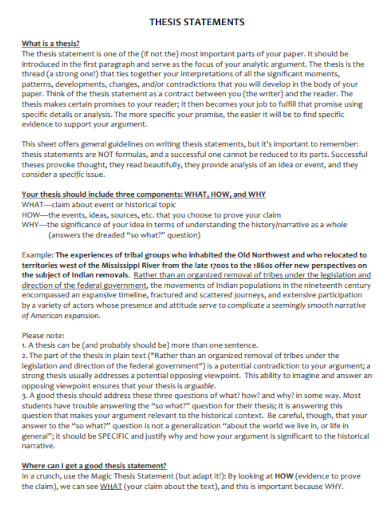
2. University Thesis Research
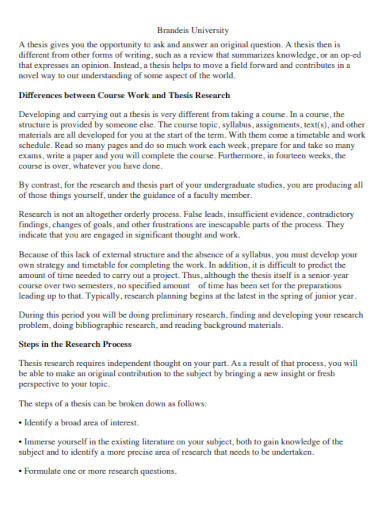
3. Working Thesis
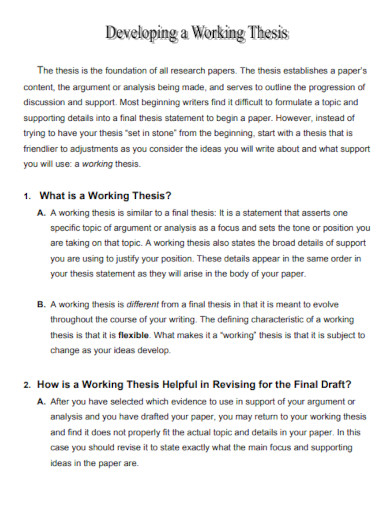
4. Master Thesis
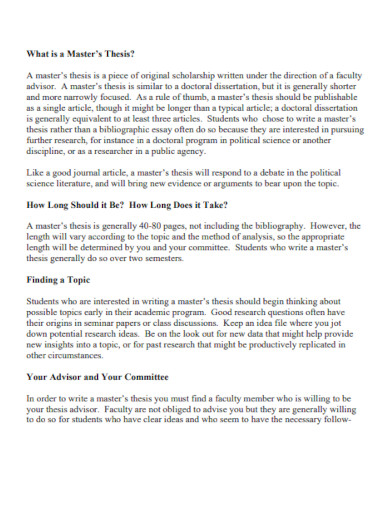
5. Basics About Thesis Statements
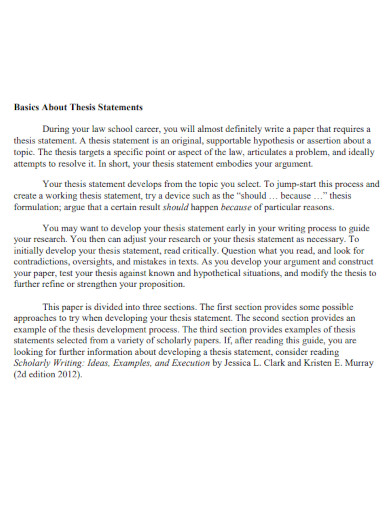
6. Thesis Sample
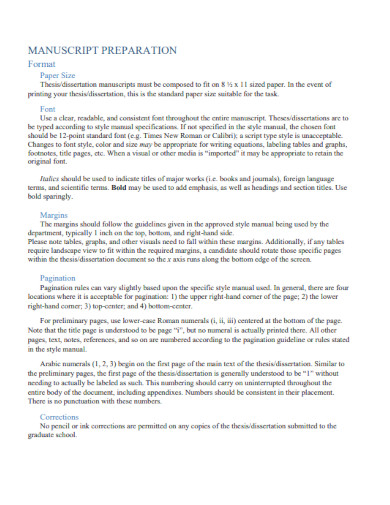
7. Thesis Format
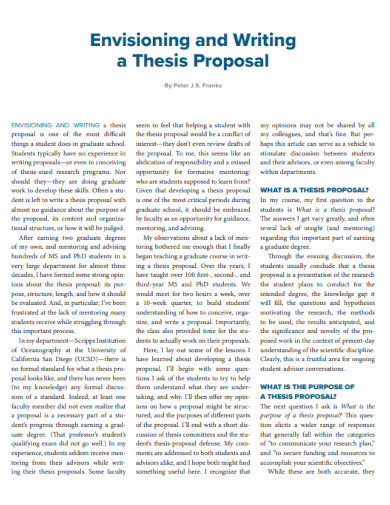
8. Thesis PDF
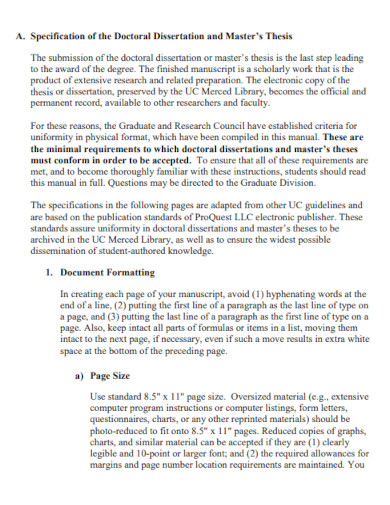
9. Graduate Students Thesis
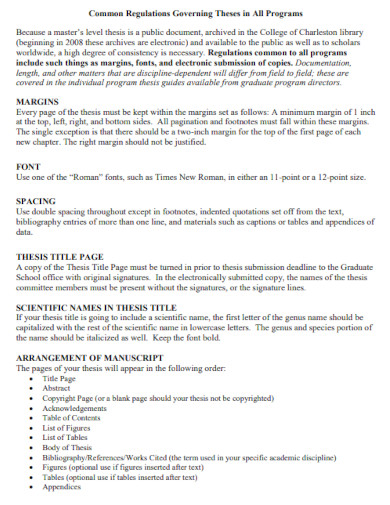
10. Thesis Example
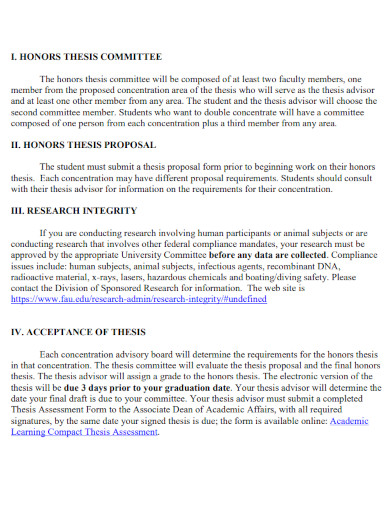
Tips for Writing Your Thesis
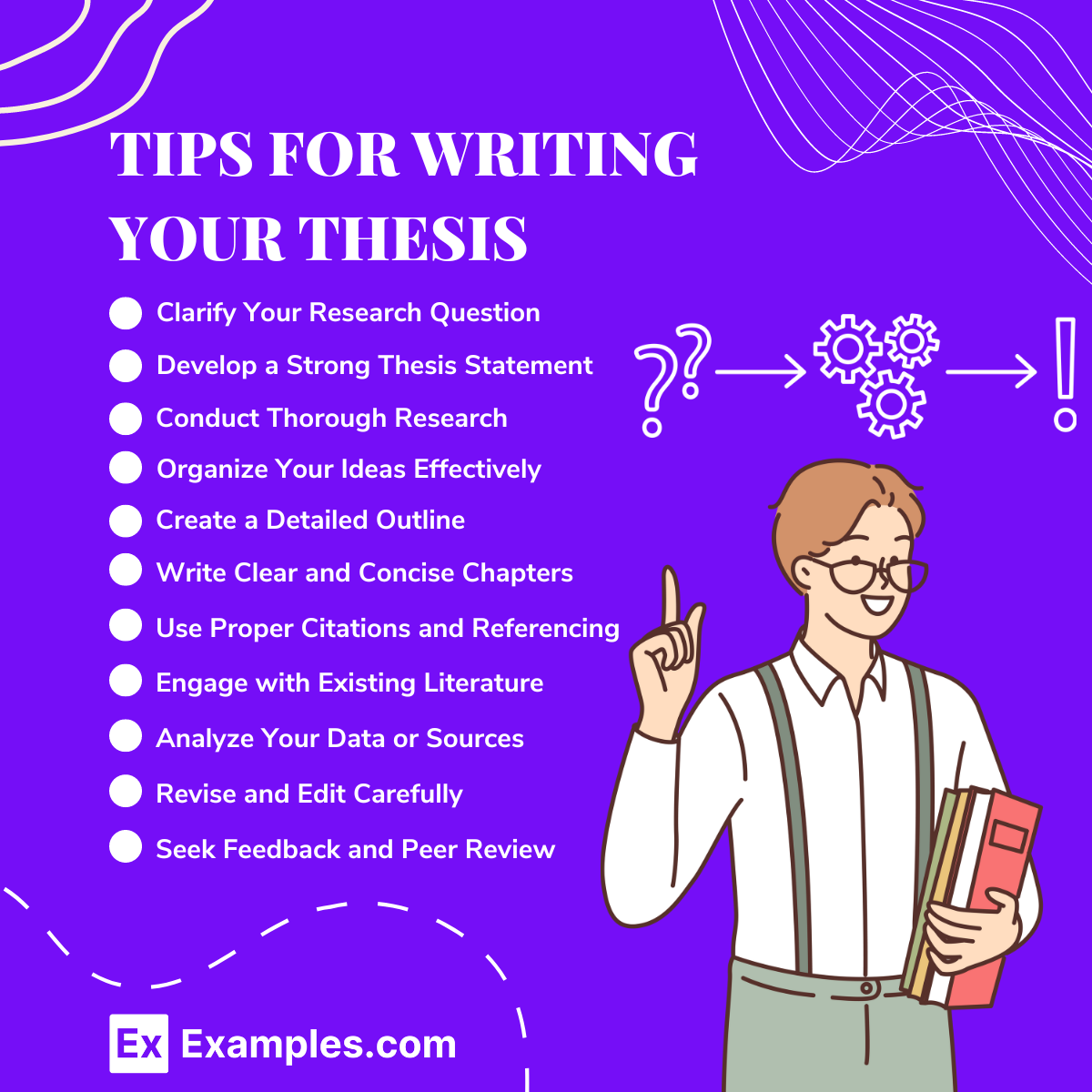
Start Early
- Begin your thesis process early to allow ample time for research , writing , and revisions.
Choose a Relevant Topic
- Select a topic that interests you and has sufficient research material available. Ensure it is specific enough to be manageable but broad enough to find sources.
Develop a Strong Thesis Statement
- Craft a clear, concise thesis statement that outlines the main argument or focus of your paper. This will guide your research and writing.
Create an Outline
- Plan your thesis structure with a detailed outline. Include sections for the introduction, literature review, methodology, results, discussion, and conclusion.
Conduct Thorough Research
- Use a variety of sources, such as books, journal articles, and credible websites. Take detailed notes and organize your research to support your thesis statement.
Write in Stages
- Break down the writing process into manageable stages. Start with the introduction, move to the literature review, then the methodology, and so on.
Maintain Consistent Formatting
- Follow the required formatting style (e.g., APA, MLA, Chicago) consistently throughout your thesis. Pay attention to citation rules and references.
Seek Feedback
- Regularly consult with your advisor and seek feedback from peers. Incorporate their suggestions to improve your work.
Edit and Revise
- Set aside time for multiple rounds of editing and revising. Check for clarity, coherence, grammar, and spelling errors.
Stay Organized
- Keep all your research materials, notes, and drafts well-organized. Use tools like folders, labels, and reference management software.
Stay Motivated
- Set small, achievable goals and reward yourself for meeting them. Stay positive and remember that writing a thesis is a marathon, not a sprint.
Proofread Thoroughly
- Conduct a final proofread to catch any remaining errors. Consider using grammar checking tools or hiring a professional proofreader.
What to include in a Thesis
Writing a thesis involves several critical sections that contribute to the overall structure and argumentation of the research. Here’s a guide on what to include in a thesis:
1. Title Page
- Title: Clear, concise, and descriptive.
- Author’s Name
- Institutional Affiliation
- Date of Submission
- Advisor’s Name
2. Abstract
- Summary: Brief overview of the research.
- Key Points: Main objectives, methods, results, and conclusions.
- Word Limit: Typically 150-300 words.
3. Table of Contents
- Sections and Subsections: With corresponding page numbers.
4. List of Figures and Tables
- Figures/Tables: Numbered and titled with page numbers.
5. Introduction
- Background: Context of the study.
- Problem Statement: The issue being addressed.
- Objectives: What the research aims to achieve.
- Research Questions/Hypotheses: Specific questions or hypotheses the study will test.
- Significance: Importance of the study.
6. Literature Review
- Overview of Existing Research: Summarize previous studies.
- Theoretical Framework: The theories guiding the research.
- Gaps in Literature: Identify what has not been addressed.
7. Methodology
- Research Design: Type of study (e.g., qualitative, quantitative).
- Participants: Who was involved in the study.
- Data Collection: How data was gathered (e.g., surveys, experiments).
- Data Analysis: Methods used to analyze the data.
- Ethical Considerations: How ethical issues were handled.
- Findings: Present data and key results.
- Visuals: Use tables, graphs, and charts for clarity.
- Statistical Analysis: Include relevant statistical tests.
9. Discussion
- Interpretation of Results: What the findings mean.
- Comparison with Existing Literature: How results align or contrast with previous research.
- Implications: Practical or theoretical implications.
- Limitations: Discuss limitations of the study.
- Future Research: Suggestions for future studies.
10. Conclusion
- Summary of Findings: Recap main findings.
- Restate Importance: Reiterate the study’s significance.
- Final Thoughts: Concluding remarks.
11. References
- Citations: Complete list of all sources cited in the thesis.
- Formatting: Follow a specific citation style (e.g., APA, MLA).
12. Appendices
- Supplementary Material: Additional data, questionnaires, or detailed descriptions.
Thesis vs. Dissertation
| Demonstrates mastery of a subject | Contributes new knowledge to the field | |
| Typically for Master’s degree | Typically for Doctoral (PhD) degree | |
| Generally shorter (50-100 pages) | Generally longer (100-300+ pages) | |
| Focuses on existing research and literature | Involves original research and data | |
| May involve original research or analysis | Primarily involves original research | |
| Structured around existing knowledge | Structured around original findings | |
| Show understanding and ability to analyze | Show ability to conduct independent research | |
| Typically 1-2 years | Typically 2-5 years | |
| Usually reviewed by a smaller committee | Reviewed by a larger committee and public defense | |
| Demonstrates competency in the field | Advances knowledge in the field |
How do I know if my Thesis is strong?
Clear and specific thesis statement.
- Precision : Your thesis statement should be clear, specific, and concise. It should articulate the main argument or focus of your thesis.
- Focus : Ensure it directly addresses the research question without being too broad or vague.
Well-Defined Research Question
- Relevance : The research question should be significant to your field of study.
- Feasibility : Make sure it is practical and manageable within the scope of your resources and time frame.
Comprehensive Literature Review
- Depth : Your literature review should cover relevant research and show an understanding of key theories and findings.
- Gaps Identification : Highlight gaps in the existing literature that your thesis aims to fill.
Solid Methodology
- Appropriateness : The chosen methodology should be suitable for answering your research question.
- Detail : Clearly describe your research design, data collection methods, and data analysis procedures.
- Justification : Explain why these methods are the best fit for your study.
Strong Evidence and Analysis
- Support : Provide ample evidence to support your thesis statement and arguments.
- Critical Analysis : Critically analyze the data, showing how it supports or contradicts your hypothesis.
- Consistency : Ensure that all evidence is consistently interpreted and integrated into your argument.
Coherent Structure
- Organization : The thesis should be well-organized with a logical flow of ideas.
- Clarity : Each section should clearly contribute to the overall argument.
- Transitions : Use smooth transitions between sections to maintain coherence.
Original Contribution
- Innovation : Your thesis should offer new insights or findings in your field.
- Significance : Highlight the importance and impact of your research.
Proper Formatting and Style
- Formatting : Follow the required formatting guidelines (APA, MLA, Chicago, etc.) consistently.
- Grammar and Spelling : Proofread your work to ensure it is free from grammatical and spelling errors.
- Citations : Properly cite all sources and provide a comprehensive reference list.
Feedback and Revision
- Advisor Feedback : Regularly seek feedback from your advisor and incorporate their suggestions.
- Peer Review : Get input from peers to identify areas for improvement.
- Multiple Revisions : Be prepared to revise your thesis multiple times to enhance its quality.
Self-Assessment
- Alignment : Ensure that all parts of the thesis align with the thesis statement.
- Completeness : Check that all required sections are included and thoroughly addressed.
- Confidence : Be confident in your arguments and the quality of your research.
How to Make a Thesis
Where do you often begin when you want to make a thesis? Many may say to begin by drafting, to begin by making an outline or to start at the introduction. A lot of these answers may even confuse you and may make you think that making a thesis is difficult or confusing. Stop right there, there are answers to every question, and to show you the thesis statement writing tips .
Step 1: Make an Outline for the Thesis
Start out by making a thesis outline . The outline will help you as it acts as the backbone of your entire thesis. Making outlines also help you by giving you a good view of what comes first, what should be added here and what should not be added. Outlining your thesis is often the best way to begin.
Step 2: Start with a Thesis Proposal for Your Thesis Paper
Once you have a blank outline for your thesis, which you will be filling out in order to know what goes first, the next thing to do is to pick a topic or pick a thesis proposal . This is an important part of making your thesis paper. Start with thinking about what kind of thesis proposal you want to talk about.
Step 3: Write Down the Introduction of Your Thesis
Thesis introduction has an important role to play. Its role in your thesis is to give a short summary of what can be expected in your thesis. The introduction of your thesis is all about the topic or the proposal of your thesis. When you write your thesis, make sure that the introduction should be clear and concise. After the introduction, the heart of your thesis will follow.
Step 4: Finalize Your Thesis Paper
Finalizing your thesis paper may take a lot of time and effort. But not to worry. It is always necessary and understandable that finalizing your thesis paper is important. As long as you are making sure that everything that is necessary, the introduction, the proposal, the thesis problem, solution and conclusion are present.
How do I choose a thesis topic?
Choose a topic that interests you, has ample research material, is specific enough to be manageable, and aligns with your academic goals.
How long should my thesis be?
Thesis length varies by discipline and degree level; Master’s theses are usually 50-100 pages, while PhD dissertations can be 100-300+ pages.
What is a thesis statement?
A thesis statement is a concise summary of the main point or claim of your thesis, guiding your research and writing.
How do I structure my thesis?
A typical thesis structure includes a title page, abstract, table of contents, introduction, literature review, methodology, results, discussion, conclusion, and references.
How important is the literature review?
The literature review is crucial as it contextualizes your research, highlights gaps, and demonstrates your understanding of existing scholarship.
What is the difference between a thesis and a dissertation?
A thesis is usually for a Master’s degree and demonstrates mastery of a topic, while a dissertation for a PhD contributes new knowledge to the field.
How do I manage my time effectively while writing my thesis?
Create a detailed timeline, break the process into manageable tasks, set deadlines, and regularly consult with your advisor.
How do I ensure my thesis is original?
Conduct thorough research, properly cite sources, use plagiarism detection tools, and contribute unique insights or findings to your field.
What should I do if I encounter writer’s block?
Take breaks, set small writing goals, change your environment, seek feedback, and stay connected with your advisor for guidance and support.
Text prompt
- Instructive
- Professional
10 Examples of Public speaking
20 Examples of Gas lighting

Elizabeth Hoover Wins 2024 Pat Holt Prize for Critical Arts Writing
Author: Emmanuel Henderson
June 17, 2024
Lambda Literary is delighted to announce Elizabeth Hoover as the winner of the Pat Holt Prize for Critical Arts Writing!
The Pat Holt Prize for Critical Arts Writing is presented in memory of the celebrated author and long-time SF Chronicle book review editor Patricia Holt and honors LGBTQ Critical Writing on Arts & Literature. The award will go an LGBTQ arts critic or literary reviewer committed to examining queer works of art and culture, as Holt ground-breakingly did for 16 years. This award is made possible by Lesbians for Good, a fund of the Horizons Foundation, and includes a cash prize of $4,000.
About Elizabeth Hoover

Elizabeth Hoover is the author of the archive is all in present tense, winner of the 2021 Barrow Street Book Prize. Her creative nonfiction has appeared in the North American Review , the Kenyon Review , and StoryQuarterly and her writing about art, pop culture, and books has appeared in Bitch, Paper, The Art Newspaper and the Washington Post . She is an assistant professor at Webster University, where she teaches such classes as LGBTQ+ Literature, Genderqueer Frankenstein, and Archival Poetics.
The judges left the following comment on Hoover’s submission:
Hoover’s work is extremely well written, unique in perspective and clearly expressed without pretension and self-importance. This is a review in context of lived experience. Her writing is relatable and inspiring.
Related posts:
About: Emmanuel Henderson
- Pat Holt Prize for Critical Arts Writing
Subscribe to our newsletter

Do you believe in the power of queer books? Support free expression and queer creativity with a donation to Lambda Literary today. DONATE HERE
Celebrating Juneteenth with brilliant literary voices
Leon Forrest was a lifelong Chicagoan who used his writing to chronicle life and myth on the South Side, first as a newspaper journalist, and later, as an author who worked with notable figures such as Toni Morrison and Ralph Ellison.
In addition to teaching at Northwestern from 1973 until his death in 1997, Forrest served as chairman of what was then the African American Studies department from 1985 to 1994. Some of his most popular courses included Studies in Spiritual Agony and Rebirth, Art of James Baldwin and Black Families in Literature.
During his career, he penned four novels, among other works, featuring his jazz- and blues-inspired prose. His final novel, often called his magnum opus, was “Divine Days.” The sprawling book chronicles one week in 1966 in Forest County — a fictionalized version of Chicago’s South Side — through the eyes of Joubert Jones, a veteran and aspiring playwright who recently returned there.
Though it was lauded by critics, “Divine Days” faced obstacles: Its original printing was destroyed in a warehouse fire, and many of Forrest’s requested revisions weren’t implemented in the next editions.
The novel had fallen out of print until early last year, when publishing imprint Seminary Co-op Offsets reissued it. The imprint, which focuses on Chicago literary voices, is a collaboration between Northwestern University Press and the iconic Seminary Co-op Bookstores in Hyde Park. “Divine Days” is its first project.
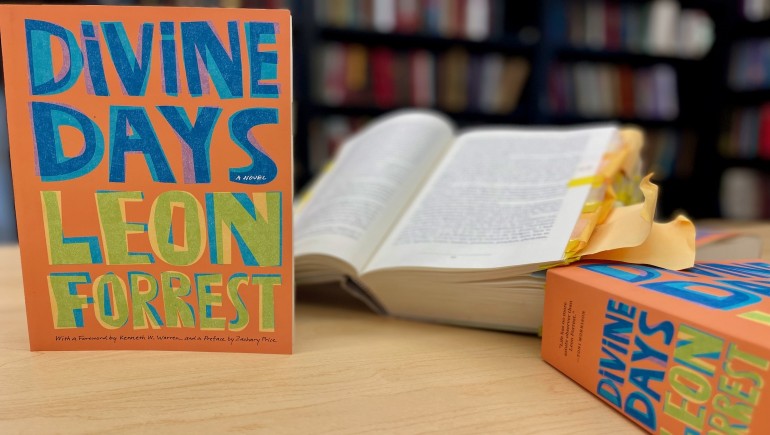
Seminary Co-op Offsets’ reissued “Divine Days” includes updated text that better reflects Forrest’s vision and an added table of contents and character list to guide readers’ journeys through the 1,168-page work. The book is also among more than a dozen titles included in Northwestern University Press ’ 2024 Juneteenth sale.
Northwestern Now recently sat down with Press staff to learn about the reissue of “Divine Days,” why Juneteenth is an especially fitting time to dive into the novel and more.
Why was it important to the Press to publish a version of “Divine Days” that better matched Forrest’s vision?
“In short, because this is a literary masterpiece! The music of this book will get under your skin. But also, this was a labor of love because we felt very close to Leon Forrest as we worked to restore the book to his original vision. Leon Forrest taught at Northwestern University for more than two decades. He lived in Evanston. A lot of the book is set in Chicago, very recognizable to those who know the South Side and the West Side.”
— Anne Gendler, managing editor and director of editorial, design and production
How would you describe Leon Forrest’s writing style?
“There is something about the lost art of music in prose, be it the language, dialect or premise of the story. Chicago writers like Forrest, Cyrus Colter, Carl Sandburg and Gwendolyn Brooks mastered lyrical undertones in their work. Leon Forrest possesses a controlled rhythm in his work that reads like musical prose.”
— Parneshia Jones, director of Northwestern University Press
Each change we made was small in isolation, but the cumulative effect was a sea change.”
What changes does the republished version of “Divine Days” have from the original? How do they better reflect Forrest’s vision for his work?
“We had already committed ourselves to bringing out a new edition of ‘Divine Days’ when the author’s grandson Zachary Price forwarded us a letter from Forrest’s literary agent, referencing errors in the original that the author had always wanted to correct. Along with the letter was a copy of the hardcover edition of ‘Divine Days’ annotated by Forrest himself. It was filled with hundreds of Post-it notes, flagging corrections regarding spelling, punctuation and formatting. (The corrections had reached [publisher W. W. Norton & Company] too late for them to be incorporated into the next printing, which was already underway.)
The Press decided to make those hundreds of changes, and they emboldened us to fix other similar errors that we saw ourselves and which we believed the author would have wanted us to correct. Some of these errors were camouflaged by the experimental nature of the writing or the use of dialect and deliberate misspellings elsewhere. We had to work very carefully to remain faithful to Forrest’s vision.
Each change we made was small in isolation, but the cumulative effect was a sea change. Our edition should provide for a smoother reading experience and one that more closely adheres to the author’s intentions.”
— Anne Gendler
Tell me about a few of the other books you’re highlighting for Juneteenth.
“Over two decades, Patricia Smith searched estate sales and talked to elders to amass a collection of rare 19th-century photographs of Black men, women and children. In ‘ Unshuttered: Poems ,’ Smith imagines the stories these people may have told if America had allowed them to.
‘ Feelin: Creative Practice, Pleasure, and Black Feminist Thought , ’ by Bettina Judd looks at how Black women artists approach and produce knowledge as sensation: internal and complex, entangled with pleasure, pain, anger and joy, and manifesting artistic production itself as the meaning of the work.
Last is a book close to us as a university press: Lavelle Porter’s ‘ The Blackademic Life: Academic Fiction, Higher Education, and the Black Intellectual .’ This book evaluates how Black writers depicted academic and campus life in literature and produced counternarratives that celebrate Black intelligence and argue for the importance of higher education.”
— Kristen Twardowski, director of sales and marketing
How can these stories, especially “Divine Days,” help us celebrate and commemorate Juneteenth?
“Juneteenth is about celebrating the past and looking to the future, and these books do just that. ‘Divine Days , ’ in particular, showcases Black legacies. The book is about jazz, and literature, and cinema, and Shakespeare, and the Bible, and classical mythology. It’s about Chicago — the place, the people. Even though ‘Divine Days’ was first published [decades] ago, reading it, you can feel the spirit that still exists in the South Side today. And though the original printing of the book was destroyed in a warehouse fire at Another Chicago Press in 1992, the book has been rebirthed through Seminary Co-op Offsets. I can think of nothing more poetic or truer to Juneteenth than that.”
— Kristen Twardowski
Editor’s Picks

Chicago HOPES for Kids will be the 2025 Dance Marathon primary beneficiary
‘the night watchman’ named next one book selection, fatherhood’s hidden heart health toll, related stories.

From haunted hotels to hip-hop history
Writing history in the present tense, why multilingualism is a ‘superpower’.

IMAGES
VIDEO
COMMENTS
Table of contents. Step 1: Reading the text and identifying literary devices. Step 2: Coming up with a thesis. Step 3: Writing a title and introduction. Step 4: Writing the body of the essay. Step 5: Writing a conclusion. Other interesting articles.
This thesis focuses on the idea of social corruption and the device of imagery. To support this thesis, you would need to find images of beasts and cannibalism within the text. This handout covers major topics relating to writing about fiction. This covers prewriting, close reading, thesis development, drafting, and common pitfalls to avoid.
Example: In "Barn Burning," William Faulkner shows the characters Sardie and Abner Snopes struggling for their identity. 2. In (title of work), (author) uses (one aspect) to (define, strengthen, illustrate) the (element of work). Example: In "Youth," Joseph Conrad uses foreshadowing to strengthen the plot. 3.
Trying to write a thesis statement for a literary analysis essay? Learn how to write a polished thesis in this quick tutorial, whether you're crafting an ess...
Step 5: Write a Working Thesis Statement. Once you've gathered evidence and narrowed down your topic, you're ready to refine that topic into a thesis statement. As you continue to outline and write your paper, this thesis statement will likely change slightly, but this initial draft will serve as the foundation of your essay.
The Literary Thesis Statement. Literary essays are argumentative or persuasive essays. Their purpose is primarily analysis, but analysis for the purposes of showing readers your interpretation of a literary text. So the thesis statement is a one to two sentence summary of your essay's main argument, or interpretation.
The first thesis merely describes something about the poem; the second tells the reader what the writer thinks the poem is about--it offers a reading or interpretation. The paper would need to support that reading and would very likely examine the way Parker uses images of suicide to make the point the writer claims.
Use Literary Terms in Thesis Only to Make Larger Points. Poems and novels generally use rhyme, meter, imagery, simile, metaphor, stanzas, characters, themes, settings and so on. While these terms are important for you to use in your analysis and your arguments, that they exist in the work you are writing about should not be the main point of ...
Step 2: Write your initial answer. After some initial research, you can formulate a tentative answer to this question. At this stage it can be simple, and it should guide the research process and writing process. The internet has had more of a positive than a negative effect on education.
This is where you could build the roadmap aspect of the thesis: list the elements in the order you will write about them in, and suddenly you will have a clear path for entire literary analysis. 3. Clear and Concise. This may seem obvious, but it is crucial. A clear thesis will play into the idea of a roadmap, but it will also avoid using long ...
The thesis (pronounced thee -seez), also known as a thesis statement, is the sentence that introduces the main argument or point of view of a composition (formal essay, nonfiction piece, or narrative). It is the main claim that the author is making about that topic and serves to summarize and introduce that writing that will be discussed ...
Writing Thesis in Literature. Writing a thesis allows students to pursue an individualized course of study and create a lasting work of scholarship, acquiring new research and communication skills en route. A thesis is not required for all Literature majors, but is highly recommended for those considering graduate-level study in the humanities.
You may also want to include background information relevant to your thesis and necessary for the reader to understand the position you are taking. In addition, you need to include the title of the work of literature and name of the author. The following are satisfactory introductory paragraphs which include appropriate thesis
The thesis statement in an essay serves as the guiding principle, encapsulating the central message or argument of your work. In the context of a literary analysis essay, this statement should directly respond to the prompt or question presented. If the essay is centered around a specific query, the thesis statement should effectively provide a ...
A literary analysis essay discusses a particular aspect of a work of literature. It essentially presents an argument or an interpretation about that work. Developing a clear, concise thesis for a literary analysis essay is highly important in guiding the reader through the essay and expressing your interpretation of ...
A thesis in a literary analysis or literary research paper can take many forms. When given an assignment to analyze a work of fiction, poetry, or drama, you must first determine the requirements of the assignment. Make sure that you understand the nature of the assignment and that you follow the instructions of your professor.
When writing about poetry, include the author's name and title of the poem in your thesis statement. Many statements begin by introducing the poem and author, followed by the point you wish to make. For example, you could write, "In 'Ode on a Grecian Urn,' John Keats uses the urn as a symbol describing the relationship between humans ...
A thesis statement should be specific and make a clear, definable and arguable claim. For the literary research paper, a thesis statement may suggest a particular way of reading or understanding a story, perhaps providing an original or even controversial interpretation. Developing a Thesis Statement (Univ. of Wisconsin Madison)
Here are some key points to writing a successful thesis. a. Know your topic. Research until you know your topic from every point of view - even the ones you disagree with. Read what others have written, and take notes on main ideas that you discover. Keep track of key words related to your topic, and be sure that you have a clear idea what ...
In writing a literary analysis thesis statement, you must be able to observe, analyze, and state the importance of a literary work. To get the best result, apply the guidelines here to your writing. Many people would read a literature work for fun or purely educational purposes. However, it isn't so fun when you have to formulate a thesis ...
Writing about World Literature. This resource provides guidance on understanding the assignment, considering context, and developing thesis statements and citations for world literature papers. It also includes a PowerPoint about thesis statements in world literature for use by instructors and students.
A literature review is a survey of scholarly sources on a specific topic. It provides an overview of current knowledge, allowing you to identify relevant theories, methods, and gaps in the existing research that you can later apply to your paper, thesis, or dissertation topic. There are five key steps to writing a literature review:
Welcome to the Purdue OWL. This page is brought to you by the OWL at Purdue University. When printing this page, you must include the entire legal notice.
It provides an overview of pertinent literature related to the thesis such as texts that critically assess the existing literature to identify the gap in research and explain the need behind the study. Aims and objectives: this section of the thesis is typically one to two pages long and describes the aims and objectives of the study.
In writing the literature review, you aim to convey to your reader what knowledge and ideas have been established on a topic and their strengths and weaknesses. As a piece of writing, the literature review must be defined by a guiding concept (e.g., your research objective, the problem or issue you are discussing, or your argumentative thesis).
The Writing Center Campus Box #5135 0127 SASB North 450 Ridge Road Chapel Hill, NC 27599 (919) 962-7710 [email protected]
The Introduction to Graduate Writing vidcast series explores how writing is a conversation, a process, a social endeavor, and discipline specific. The IWE for Thesis and Dissertation writers offers material on how to set goals for and remain motivated during a long-term project. It covers topics relevant to drafting and revising documents, such ...
A thesis is a comprehensive research paper that presents a central argument or claim supported by evidence. Typically written by students pursuing advanced degrees, a thesis demonstrates a deep understanding of a subject. It includes a clear research question, literature review, methodology, analysis, and conclusions.
Elizabeth Hoover is the author of the archive is all in present tense, winner of the 2021 Barrow Street Book Prize.Her creative nonfiction has appeared in the North American Review, the Kenyon Review, and StoryQuarterly and her writing about art, pop culture, and books has appeared in Bitch, Paper, The Art Newspaper and the Washington Post.She is an assistant professor at Webster University ...
Leon Forrest was a lifelong Chicagoan who used his writing to chronicle life and myth on the South Side, first as a newspaper journalist and later as an author who worked with notable figures such as Toni Morrison and Ralph Ellison. During his career, he penned four novels, among other works, featuring his jazz- and blues- inspired prose. His final novel, often called his magnum opus, was ...